
College of Education Newsletter


Dr. Peter Hlebowitsh announces plans to step down from role as dean
College of Education Dean Dr. Peter Hlebowitsh announced he plans to step down at the end of the academic year after more than 10 years as dean. He plans to continue to serve as a professor in the College.
Hlebowitsh joined the University as dean and professor in January 2013 after serving in leadership and teaching positions at the University of Iowa and the University of Houston.
Under Hlebowitsh’s leadership, the College of Education adopted a more assertive role toward public engagement around the state. The College invested in a preschool in Gadsden that serves 36 area families, worked with the Smart Foundation to help bring school-based health clinics to schools in the Black Belt, partnered with the Mott Foundation to support a statewide afterschool and summertime learning program for school-age youth, expanded the services of the Belser-Parton Literacy Center by activating a reading clinic and providing support for parent education efforts, and, with the help of the Alabama Rehabilitation Services, opened a program that assists families with infants and toddlers with special learning needs.
The percentage of all minority groups enrolled in the College has nearly doubled since 2013. The number of minority students receiving scholarships from the College has also increased during his tenure. Additionally, the College played an active role in working with The University of Alabama Board of Trustees to rename Graves Hall to Autherine Lucy Hall, Moore Hall to Wade Hall, and helped to build a sports arena dedicated to the livelihood of college-aged athletes with ambulatory disabilities, the only facility of its kind in the country.
Other achievements include a specialized degree program in educational neuroscience at the undergraduate and graduate levels, an increase of external support for research and service efforts from $3.9 million in 2013 to $15.4 million in 2021, and an aggregate research productivity index that moved from a 51st national percentile score in 2013 to the 87th percentile score in 2022.
Dr. Liza Wilson will serve as interim dean beginning July 1.
UA will begin a broad search for the college’s next dean immediately.
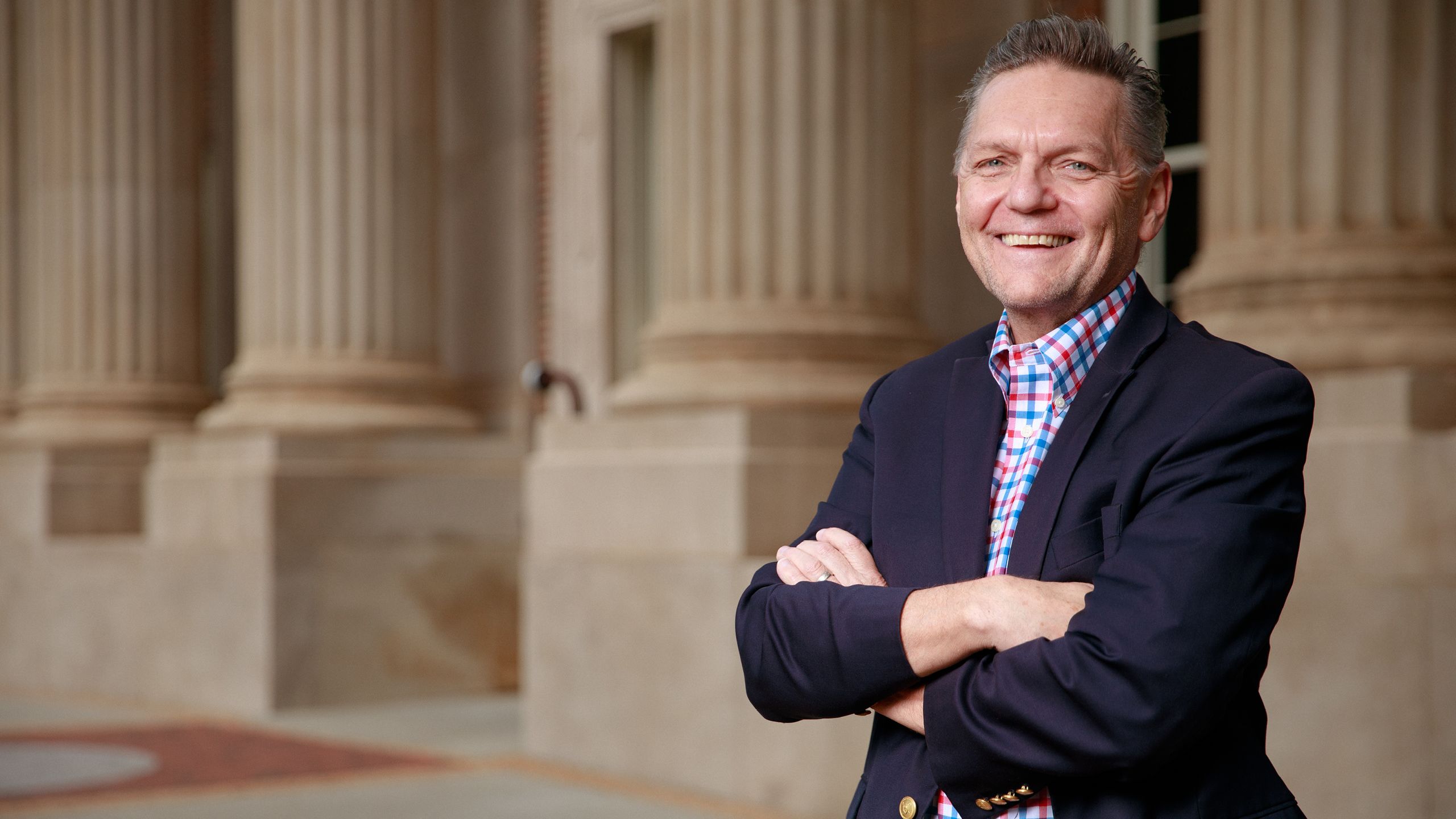
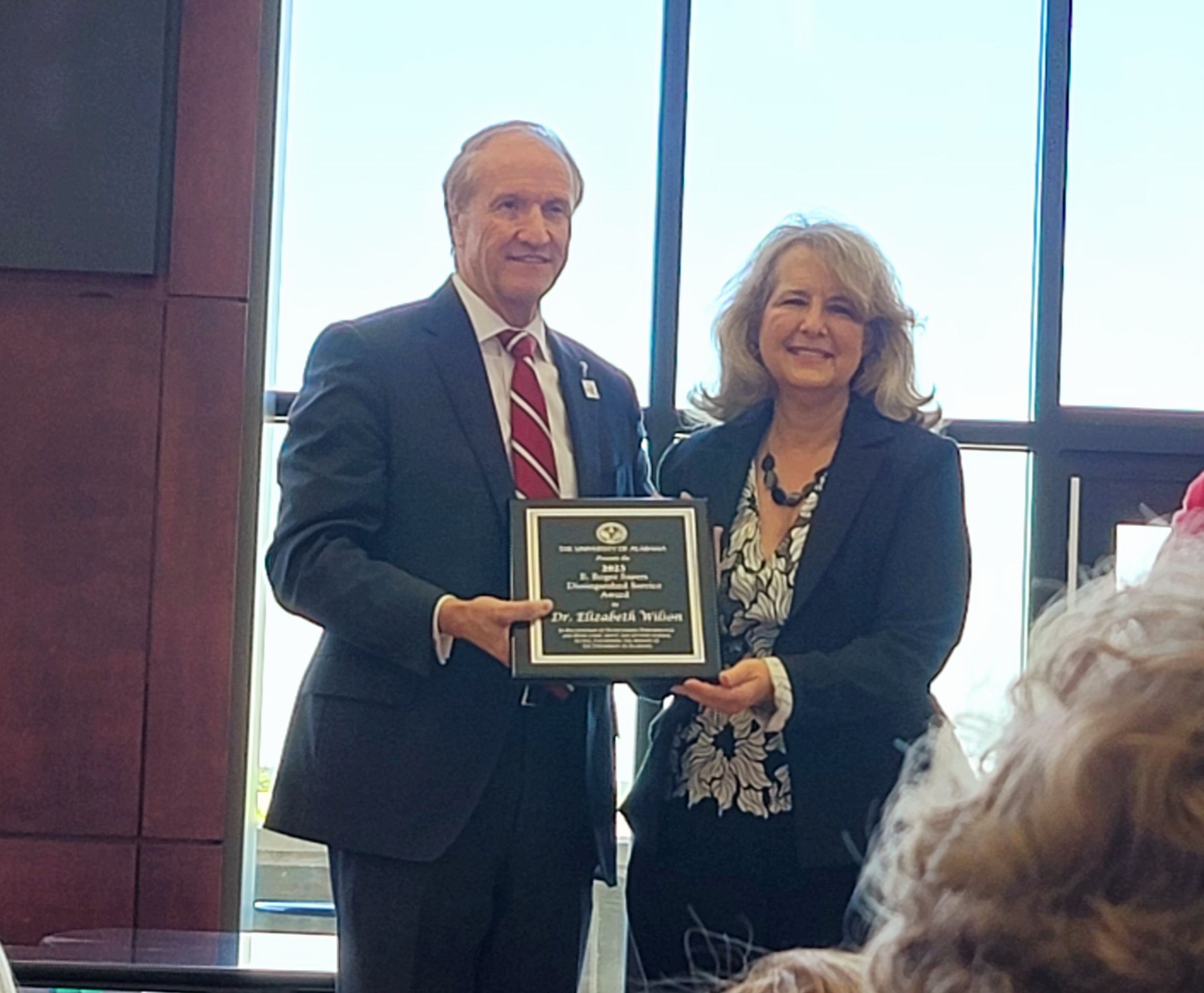
University of Alabama President Dr. Stuart Bell hands Dr. Liza Wilson the 2023 E. Roger Sayers Distinguished Service Award.
University of Alabama President Dr. Stuart Bell hands Dr. Liza Wilson the 2023 E. Roger Sayers Distinguished Service Award.
Dr. Liza Wilson honored with E. Roger Sayers Distinguished Service Award
Dr. Liza Wilson was named the 2023 E. Roger Sayers Distinguished Service Award during the Spring Campus Assembly at Bryant-Denny Stadium on April 19.
During the ceremony, University of Alabama President Dr. Stuart Bell presented Dr. Wilson with an engraved plaque in recognition of this prestigious honor and her esteemed 33-year career.
As senior associate dean, Dr. Wilson has made remarkable contributions to the University and to the College of Education, one of the most recent being her dedicated efforts to ensure the College’s successful accreditation review this spring. The review was not only excellent but named no stipulations and no areas for improvement, which is an outstanding accomplishment for the College as well as Dr. Wilson.
“The nominations for Dr. Wilson, exceptional scholar, educator, and leader, portray her persistent devotion to the University’s mission, which (she) is said to ‘view as her own through all of her undertakings for the College of Education,’” Provost James T. Dalton announced as Dr. Bell handed her the award. “In one letter of support, Dr. Wilson is praised for serving as the lead for many endeavors of the College, including accreditation and program changes where she ‘relentlessly makes sure guidelines are met and teams and committees are created to address continuous improvement.’”
Dr. Wilson was one of the early members of the Clinical Master Teacher program, now nationally recognized by the American Association of Colleges for Teacher Education. She has also assisted faculty in partnering with area schools for projects that initiate improvement as well as for ensured all Parent Teacher Leadership Academy cohorts possess practices needed to support the academic achievements of scholars. Many have benefited from her leadership and exceptional performance over the years.
“Dr. Wilson has a distinguished record of service to the University and to her field, an impressive record of research and teaching excellence,” one peer wrote in a letter of support. “She is a gem of the University and admired for her dedication to the Capstone and the College of Education.”
In 1996, the E. Roger Sayers Distinguished Service Award was created by members of the President's Cabinet and National Alumni Association to recognize faculty or exempt personnel who have gone above and beyond their normal duties and performed in an exemplary manner to further the mission of the University. The honor is named after Dr. E. Roger Sayers, who was UA president from 1988-1996.
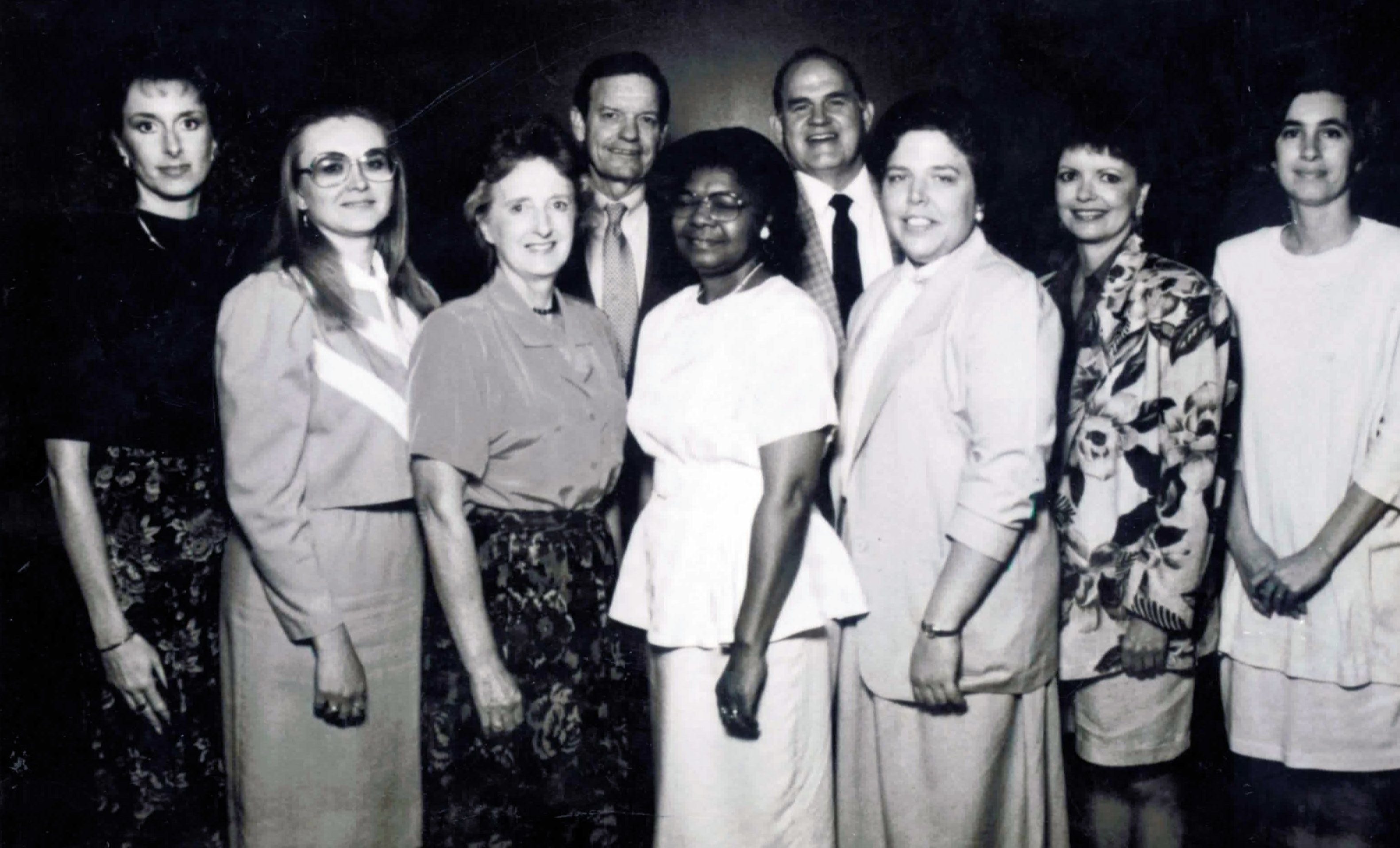
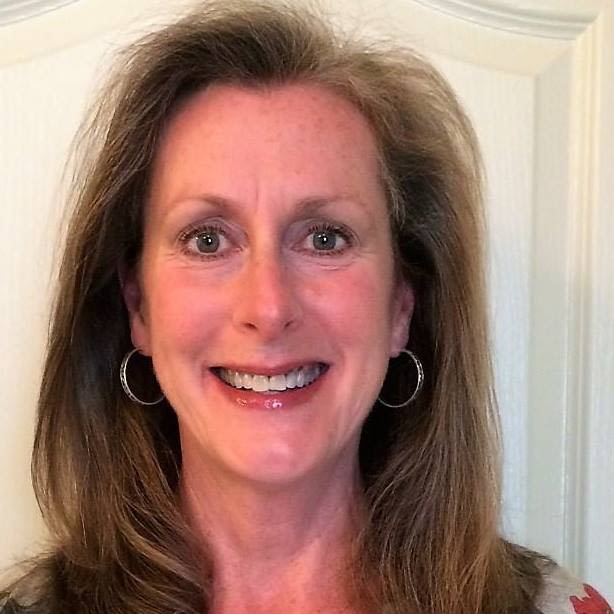
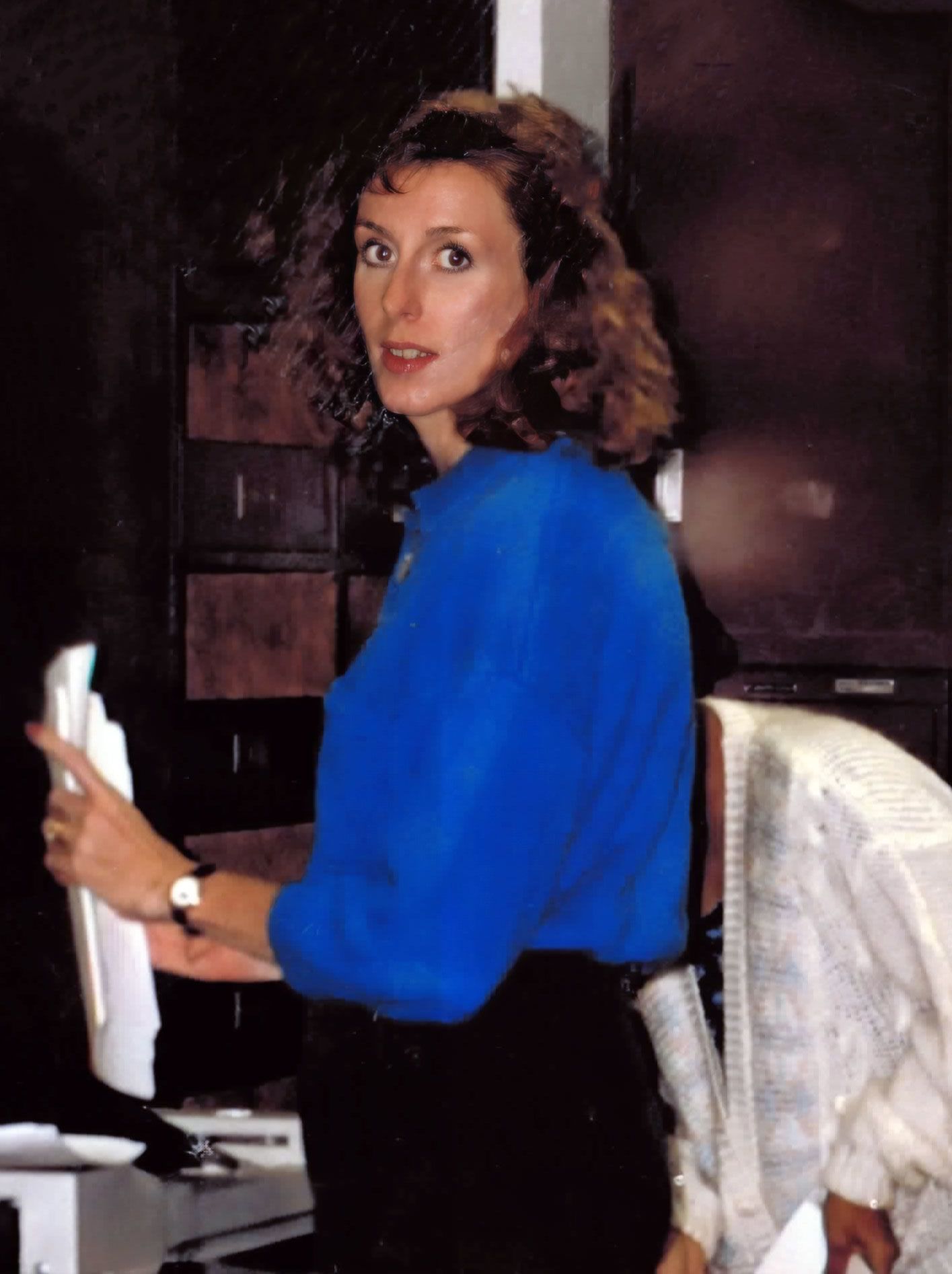
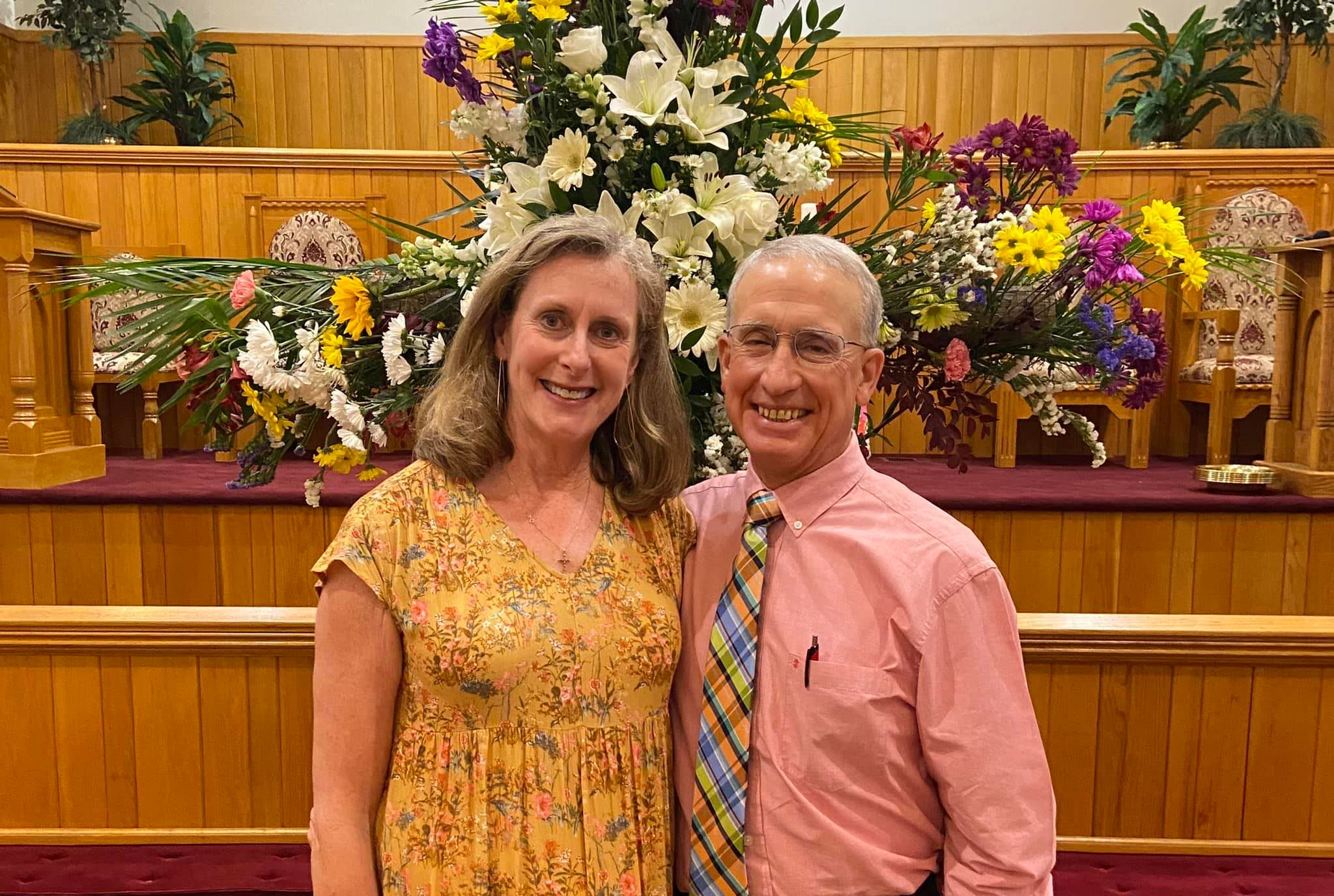

Melanie O'Rear, first on left, poses for a photo with some of her colleagues.
Melanie O'Rear, first on left, poses for a photo with some of her colleagues.



Melanie O'Rear and her husband Mike pose for a photo.
Melanie O'Rear and her husband Mike pose for a photo.
Melanie O’Rear brings 39 years at the University to a close
With nearly 40 years dedicated to working at The University of Alabama, it’s fair to say that Melanie O’Rear has spent most of her life on campus. As a child, she visited frequently with her father during his UA career and later earned her degree from the College of Education, starting her own UA career soon after. She holds the friendships she’s built over the years very close and will be carrying them with her as she retires from her position as operations coordinator for the Dean’s Office in the College of Education.
“I think what's been the most engaging and important thing for me is my relationship with people,” O’Rear said of her 39 years at the University. “That's what I'm taking away from this and what I valued the most in my time here is my interactions with and friendships that I've made with colleagues inside and outside the College – that's just been the most rewarding thing for me.”
She said at times, it does feel as though she grew up on campus. O’Rear and her family lived close by in a small neighborhood in central Tuscaloosa. Her father, Dr. Marcus L. Roberts Jr., worked at the University in various roles – Registrar and Instructor in Education, Acting Dean of the College of Education, and Assistant Dean for Student Services among others – from 1954 until his retirement in 1987. She has fond memories of accompanying him to work on days where her mother was busy.
Dr. Roberts’ office was in Graves Hall, now Autherine Lucy Hall, and she recalls that as her father worked, she and her brother would sometimes entertain themselves by dashing up and down the stairs and stomping their feet in the rotunda, eager, as children often are, to hear how the echoes would bounce around the walls.
“I remember all of the faculty members at that time and the kind staff people, so it was a natural progression for me to think, ‘I would love to work in the College of Education,’ because I already knew so many people as far back as I could remember,” O’Rear said.
After finishing high school, and being in the very first class to graduate from Central High School after Tuscaloosa High’s name change, she attended UA where she earned her degree in business and office education in 1984. As she began her job search, she found there were no vacancies in the Tuscaloosa city and county schools. However, she reached out to her alma mater and applied for a job in the Speech Communication Department. Soon, she began working in the UA College of Communication and Information.
Two years later, another position became available, this time at the College of Education, and O’Rear applied. To her delight, she received an offer for the job after interviewing with the late Dr. Rodney Roth, dean of the College at the time, who was “very kind and dear,” she said.
Since accepting and becoming operations coordinator in August 1986, O’Rear has worked for five different deans, all of whom were very different but great in their individual ways, she said. Those deans were Dr. Rod Roth, Dr. John Dolly, Dr. Ross Palmer, Dr. James E. McLean, and, most recently, Dr. Peter Hlebowitsh, who will be stepping down at the end of the semester after 10 years as dean of the College. O’Rear said she and Hlebowitsh have joked with one another about not being able to leave until the other was ready to go as well.
“He's been amazing, amazing to work with and so understanding, and I feel like we will stay in touch and be friends,” she said. “I'm not saying goodbye to anybody, because I want to keep connected.”
The role of operations coordinator entails working closely with the dean and assisting as needed, which usually means taking on multiple responsibilities.
“This is one of those catch-all positions that, in addition to scheduling the dean, (includes) being the dean’s administrative assistant in all things, whatever comes up,” O’Rear said. “Anything the dean handles, the person in this position has to handle.”
Some of those tasks include project initiation requests, building projects, being the building representative for Carmichael Hall, to name a few. Another aspect is working with the College’s Board of Advisors, and O’Rear said she’s enjoyed watching the board become what it is today.
“I have seen that group grow from when it started in 2001 to what it is now, and some of the members that I still just cherish and enjoy have been on the board since then,” she said. “So that's been a blessing to me to see the Board of Advisors and how much they've helped our college, influenced and added scholarships, and all the ways they can advise the dean and help.”
“... There's angels all around, and there's wonderful people, and there's joy. You don't have to look too far to find it.”
Helping others is a big part of being a member of the College of Education, especially since no two days are ever the same, O’Rear said.
“I rely on others to help. I always tell anybody who comes in new, you don't work in isolation in this college – it's a team,” she said. “That's what I love, and there's no such thing as a dumb question. We help each other.”
She has seen many changes both in the College of Education and the University during her time here, one of those being when the College moved from the first floor of Graves Hall into Carmichael, which gave the Dean’s Office its own space.
“We were about the burst the walls in old Graves Hall,” O’Rear said, laughing.
As renovations took place in Carmichael so did the discovery of the rotunda in Room 311, which now houses the Nall Gallery. At one time, the room had a dropped ceiling covering the dome, she said, and the plan was to use the space for workstations and a communal area. But once the dome was revealed, those plans changed. Today, it’s used for event space and meetings and features various art pieces created by acclaimed multi-medium artist and UA alumnus Fred Nall Hollis.
“This is a fun place to be,” O’Rear said. “I love the vitality of being around all the students, and I think that gives all of us who work here a little bit different perspective.”
That chapter of her life will come to a close sooner than she expected, though.
“Unfortunately, my immediate future is going to be focusing on my health and the medical issues that have caused me to retire a little bit earlier than I'd hoped, but I'm trying to look beyond all that,” she said.
In March, O’Rear had surgery to remove a malignant brain tumor, and that event has shifted everything.
“To say it’s overwhelming and daunting is an understatement,” she said. “It completely changes your priorities in a heartbeat, because what I thought I had planned, how fiercely independent I was with driving and looking forward to retirement … and having a few months to sort of finish up at work, announce that I was going to be retiring in three or four months – no, all of that changed.”
Though this isn’t how she planned her exit, it is working out, she said, and everyone has been incredibly kind. She also expressed confidence in the specialists who will be involved in her treatment.
“It's very hard, but you know, again, there's angels all around, and there's wonderful people, and there's joy. You don't have to look too far to find it,” O’Rear said. “So, these are the things I'm focusing on right now, a positive attitude, staying healthy, staying active.”
She and her husband Mike are already planning a trip after the initial treatment for her to look forward to, and she plans to do even more traveling during her retirement. She also plans to hike and walk more with Mike and their miniature schnauzer Charlie – “we’re always happy to have an excuse (to walk),” to be more involved in their church, and to spend more time with her son, daughter-in-law, and grand-dog, as well as the rest of her family and friends.
Though she is looking to the future, O’Rear will always be proud of her career and of being part of the College of Education.
“There's been lots of changes, but this is a great place to be,” she said. “The College of Education does so much good in the world. We send so many great graduates out to do wonderful things, so I'm proud to have been associated with this.”
She has made many memories and many friends over these 39 years at The University of Alabama that she cherishes and will continue to hold dear.
“As I think about retiring and stepping away, my job here in the College is part of me. As an adult, that's all I've ever done, so I'm always very proud of where I work and who I work with, and it's just been part of my identity,” O’Rear said.
“That's going to be a little bit of a challenge after I leave, filling in those gaps, because the people I have been privileged to know and still know are such a huge part of my life. (The College of Education) is just part of who I am.”
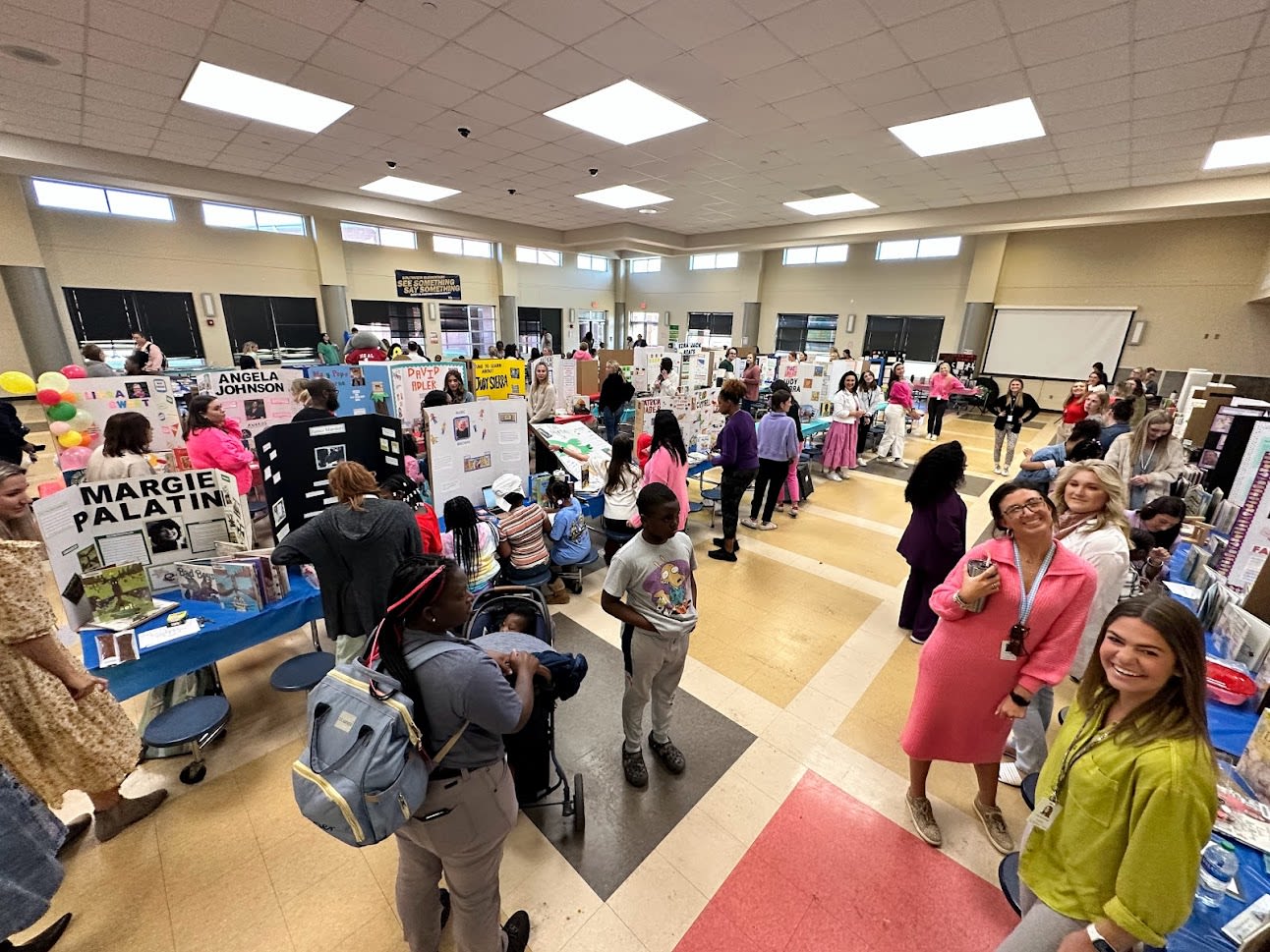
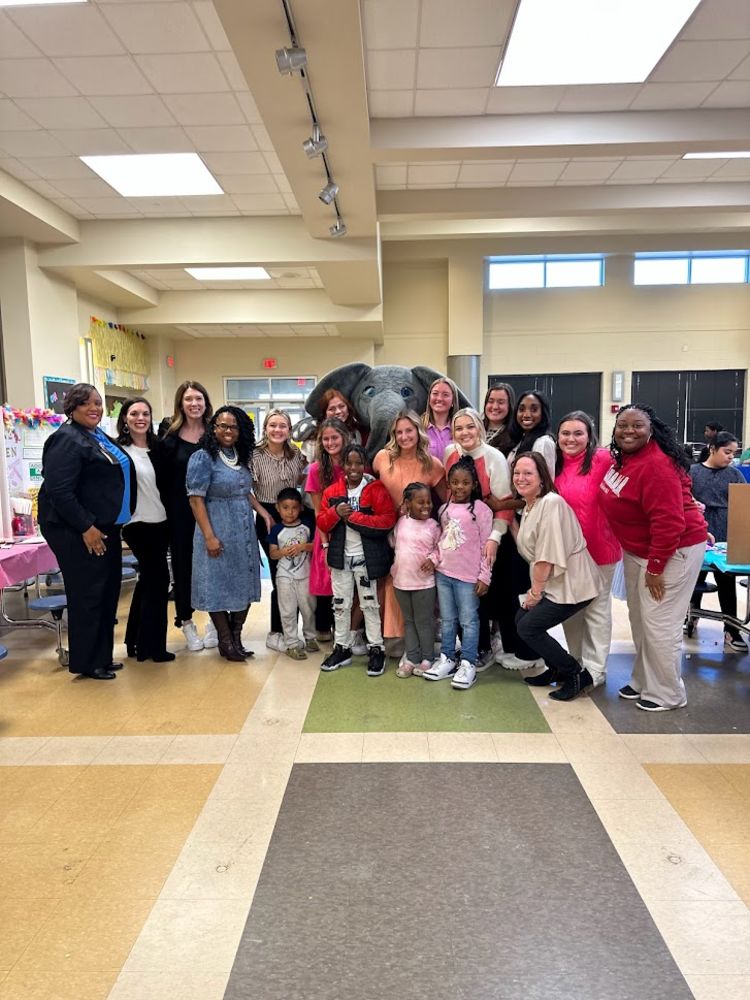

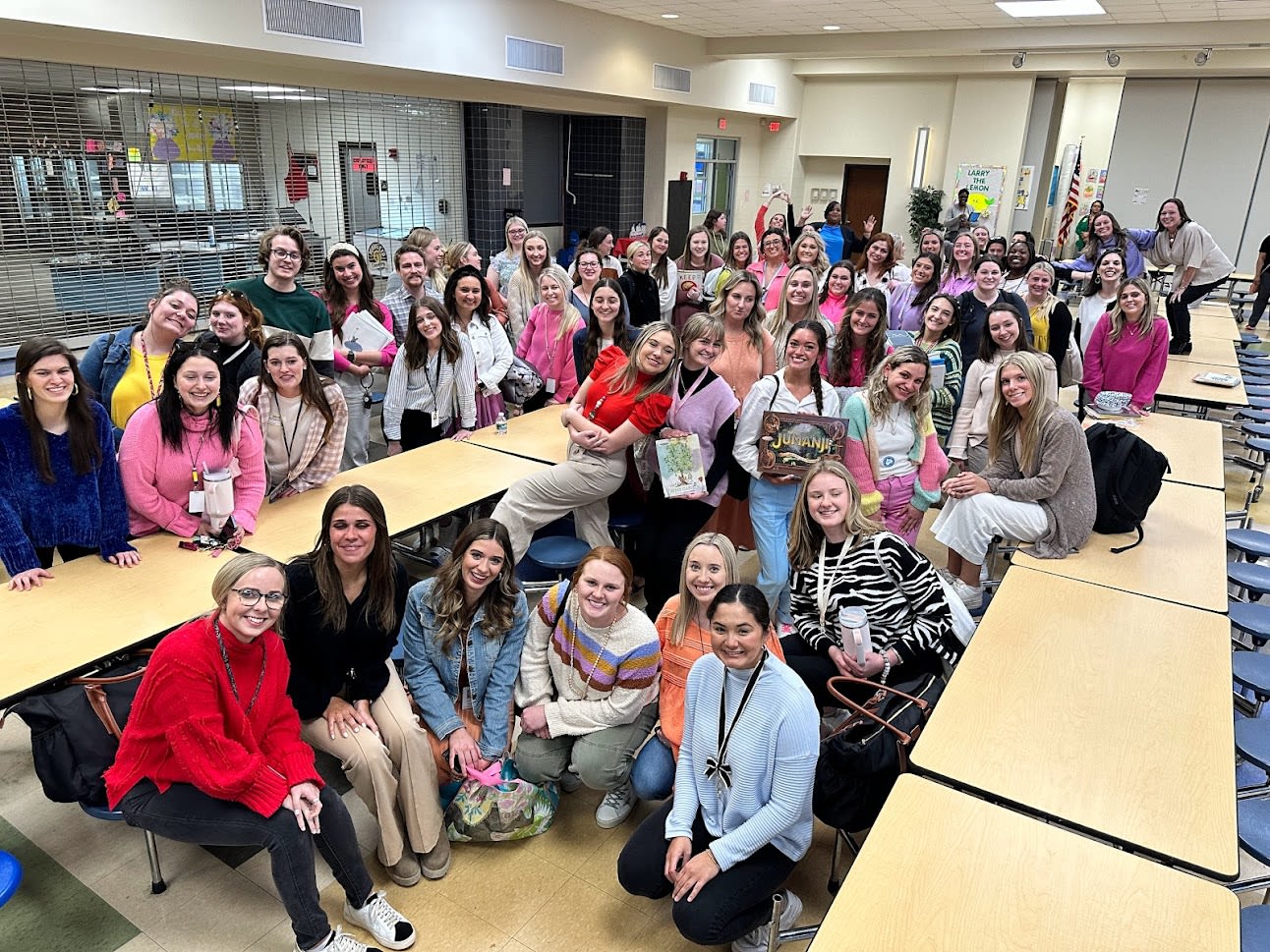

Parents, students, and educators attend Family Literacy Night at Southview Elementary School on March 21.
Parents, students, and educators attend Family Literacy Night at Southview Elementary School on March 21.

Southview Elementary School students and educators pose with Big Al at Family Literacy Night on March 21.
Southview Elementary School students and educators pose with Big Al at Family Literacy Night on March 21.

A student from Southview Elementary School stands for a photo in front of a tyrannosaurus rex projected via a green screen. The green screen was provided for the event by University of Alabama Innovation Teaching and Technology Lab.
A student from Southview Elementary School stands for a photo in front of a tyrannosaurus rex projected via a green screen. The green screen was provided for the event by University of Alabama Innovation Teaching and Technology Lab.

Family Literacy Night educators, partners, and University of Alabama pre-service teachers pose for a photo at Southview Elementary School before the event.
Family Literacy Night educators, partners, and University of Alabama pre-service teachers pose for a photo at Southview Elementary School before the event.
Program highlights importance of literacy resources in community
UA educators partner with Southview, local organizations to host Family Literacy Night
On March 21, Southview Elementary School hosted the first in-person Family Literacy Night since 2020 with the support of the College of Education’s Department of Curriculum and Instruction, the Office of School Partnerships, and the Belser-Parton Literacy Center.
This initiative not only spotlights the importance of literacy development in Tuscaloosa. It also presents Southview students, their families, and University of Alabama pre-service teachers with the opportunity to connect on a more personal level.
“There is a really unique benefit of serving a community school because you end up creating these relationships with families instead of just swooping in and never having seen them before,” Clinical Assistant Professor of Early Childhood and Elementary Education Dr. Cailin Kerch said. “We’ve gotten to see (Southview students grow from) pre-kindergarten, kindergarten, first grade, second grade. You may have a fifth-grader, who was at the original events, coming and saying, ‘I still have the book that I got!’ … Relationships are really at the center, and it creates a different dynamic for all involved.”
These types of experiences are key for the young students at Southview, but they’re also instrumental in preparing the University’s pre-service teachers. They may not have yet had interactions like these with children or their parents, and these conversations can help future educators build self-confidence and a sense of ease in navigating encounters like this in the future.
“We’re able to show our pre-service teachers how you can engage in bi-directional and supportive conversations with families,” Dr. Kerch said, “Then, for the families at Southview, it really strengthens our partnership with them and provides them a unique opportunity with The University of Alabama.”
More than 70 pre-service teachers from UA literature for children, or CEE 365, classes this semester read a variety of approved, high-quality children’s books for the class then selected authors to create projects about then present, she said. These author studies included visual aids as well as different STEM-focused activities related to the authors and their books that would engage children.
Part of the course included sharing their author studies at Family Literacy Night, with the UA students aiming to capture young curiosities with their colorful study boards and chosen STEM activities.
“(The children’s) faces just light up when they see our pre-service teachers, their big author study boards, or their different playful experiences,” Dr. Kerch said. “They just run to the students, and they end up wanting to engage. It's also an opportunity for our students to observe and glean which activities are more engaging to young children than others.”
These experiences could help raise kids’ interests in a specific author’s books, but the event as a whole could also encourage family members to take advantage of their local library and its resources.
“It's a really energizing thing to see our students engaging with families in those ways, and we're so thankful,” Dr. Kerch said. “The community is so receptive to welcoming our students in their spaces.”
“We're focusing on the child at these events, but we end up potentially providing access to other resources in the community for families. That's the goal – supporting the family on all fronts and in the community.”
Every child at Family Literacy Night receives a free, age-appropriate book. This year’s books were provided by the UA Office of School Partnerships, Tuscaloosa Public Library, and United Way Success by 6. Those given to the children by the University were curated by Dr. Carol Donovan, Belser-Parton Literacy Center’s literacy education director.
The event also gave families the opportunity to meet Big Al, try on virtual reality goggles, and interact with a green screen, courtesy of the UA Innovation Teaching and Technology Laboratory and its director Dr. James Hardin.
“We're focusing on the child at these events, but we end up potentially providing access to other resources in the community for families,” Dr. Kerch said. “That's the goal – supporting the family on all fronts and in the community.”
TPL was there to help parents sign themselves or their children up for library cards and to gain access to free digital libraries. Through United Way Success by 6, families could also register for Dolly Parton’s Imagination Library, which gives children registered for the program a free book every month from birth to the age of 5. There are additional services offered by United Way as well, “so if a family mentioned or had a need for housing, food support, or anything else that (it) covers,” Dr. Kerch said, they were able to obtain information needed to get them that help.
“Sometimes literacy can start the conversation,” she said. “… It's providing that space of connection so that families can be aware that there are other community resources that may support (them).”
In addition to those already mentioned, sponsors and partners included CEE 365 instructors Mary L. Tucker, Shayla Thomas, and Dr. Holly Swain; Kaitlyn Lynch from TPL; as well as Southview Elementary Principal Ronika Amerson and Assistant Principal Teresa Bivens.
“(This program) is really a way to wrap arms around the community at Southview and just provide additional resources that can help their mission and their work for creating a culture of literacy,” Dr. Kerch said.
Communities supporting initiatives that advocate for reading, science, math, and other important causes is vital. With further funding and more partners, it heightens the possibility for the Family Literacy Night program to serve other schools in West Alabama in addition to Southview and could potentially increase the scale and frequency of the event. But these things can only happen with the community’s support and collaboration.
“If we don't work together to serve the children and families in our community when we have the capacity and the interest to do so, then perhaps we're failing the children and the families in our community,” Dr. Kerch said. “Every opportunity that we can, if there's a program, an initiative, or business in the area that's interested, I would ask them to consider wrapping arms around their local school or around a similar program.”
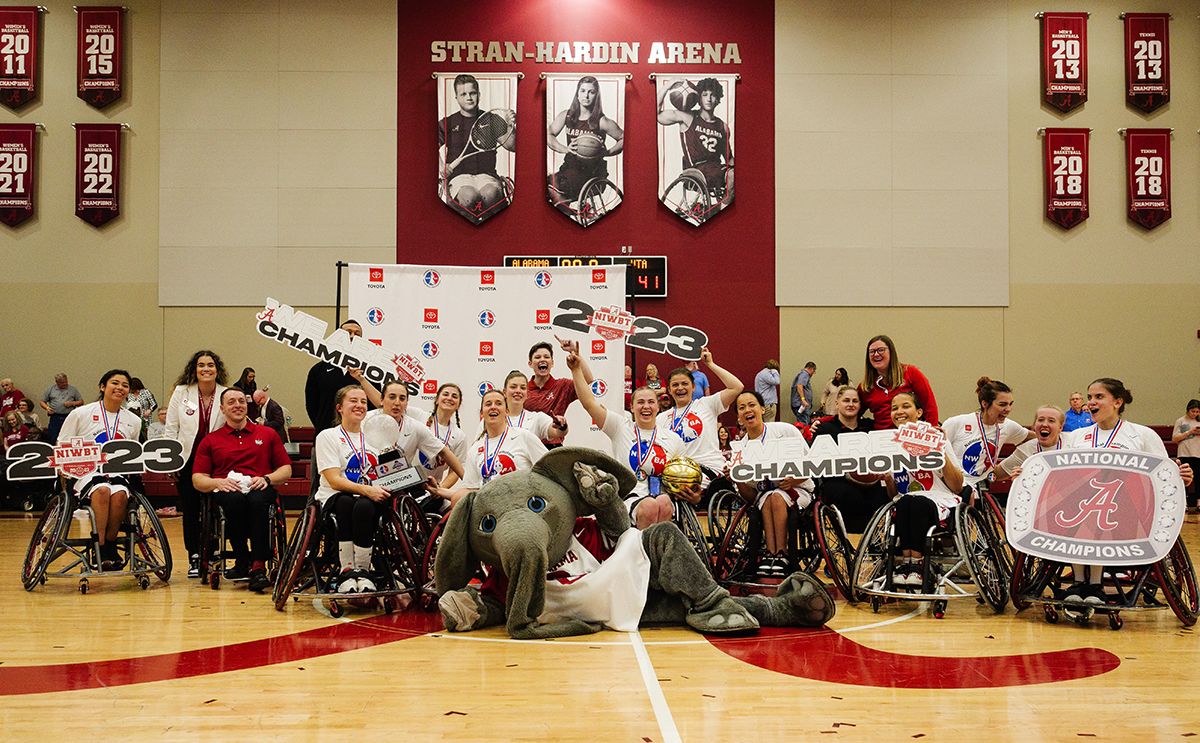
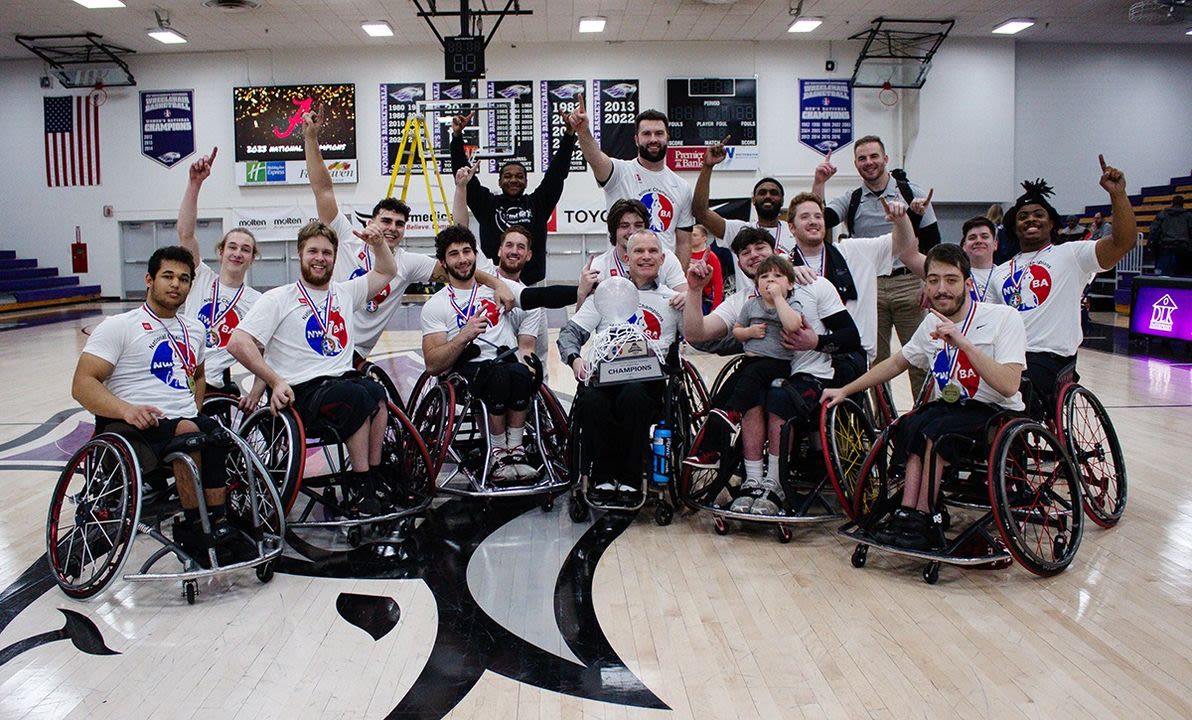
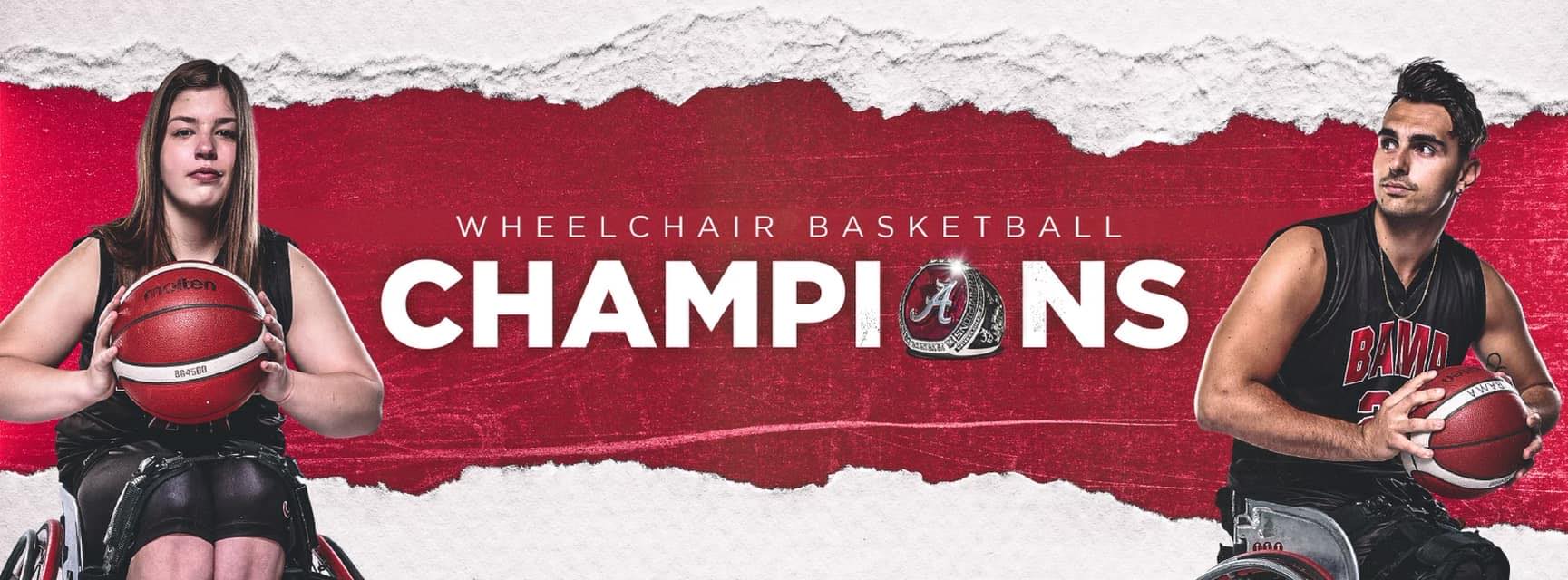



Adapted Athletics wheelchair basketball teams rack up rings with national title wins
Wheelchair tennis aims for championship; program adds para track & field for summer and makes plans to expand facility
This spring is turned out to be an exciting one for Alabama Adapted Athletics. Not only did both the men’s and women’s wheelchair basketball teams spend their breaks in March winning national championships, but wheelchair tennis will soon compete for its own chance at an NCAA championship title as well.
The UA women’s wheelchair basketball team earned their ninth national title, and third in a row, by beating UT-Arlington during the women’s National Intercollegiate Wheelchair Basketball Tournament at Stran-Hardin Arena from March 8-11. The Tide women won the final game 88-41, finishing up the 2022-23 season with an 18-0 conference record, 25-2 overall.
“The women’s (title win) was really special. It was a three-peat, so they had a lot of pressure on them to perform, and I think that they handled that well,” Alabama Adapted Athletics Marketing Director Kellcie Temple said. “They have a really special group. It's a bunch of talented women (who) came together and decided that they're going to play and be successful at everything they do.”
Everyone on the women’s team had the chance to play, too, she said, which made the victory truly special.
“They're so dominant, and their team is so deep. You can run any lineup, and they can dominate, which is always fun for an Alabama fan to watch,” Temple said.
Senior Lindsey Zurbrugg earned the ranking of tournament MVP, and she recently competed on Team USA in the inaugural Team USA vs. College All-Stars game at the NCAA Women’s Final Four. Zurbrugg also competed on Team USA at the Tokyo Paralympic Games in 2020, winning a Paralympic bronze medal.
“She's incredible. She's not only a great athlete, but she's a great person,” Temple said. “She's a great human, and she definitely puts the work in. She is here as much as I am, truly, and as an athlete that's exactly what you want, for that work ethic to be there.”
Though Zurbrugg is a transfer student, it feels like she’s been part of the team for much longer.
“She just came last year, which is crazy, because we felt like she's been here forever,” Temple said.
Junior Mary Silberman and freshman Ixhelt Gonzalez deserve mention for their exceptional gameplay during the tournament as well. Silberman was last year’s tournament MVP and is Player of the Year MVP, and Gonzalez is another of the team’s Paralympic bronze medalists having also competed at the 2020 Tokyo Games.
“I'm really excited to watch (Gonzalez) grow and to watch her flourish as an athlete because she is a true freshman,” Temple said. “She's 18 years old, so she's absolutely incredible, and it's going to be really fun to watch her as the season progresses.”
As for UA men’s basketball, the team won against the Arizona Wildcats 73-68 in the tournament at Wisconsin-Whitewater from March 15-18, earning their fourth NIWBT championship title and finishing the season with a 15-2 conference record, 25-3 overall.
“(The game) was nerve-wrecking,” Temple said, “but it was so incredible to watch them celebrate at the end. There's nothing like it. There's nothing like getting to see the athletes that you've worked with all season be rewarded for their hard work.”
The men had a lot firing them up during the tournament. For one, the players wanted to secure the national championship for their teammate Ignacio Ortega with it being his last season, but they wanted to prove themselves as well. They not only went into this year’s tournament as underdogs, being stuck as the No. 2 seed all season, but had also competed in the tournament in recent years and not been able to clench the final win.
“I think that they just decided from Day 1 that we're not going to come in second again, and it was really an attitude shift and a mindset that set them apart,” Temple said.
The men snagged the victory against the Wildcats despite having fallen to them earlier in the season during a buzzer-beater.
“We wanted the confidence of beating them going into the tournament, but I think it fueled (the players),” Temple said. “I think that it made them hungry and want the championship even more, want to beat Arizona even more.”
Ignacio Ortega was a key player in the tournament, earning the honor of MVP. Junior Peter Berry, sophomore Eric Francis, and freshman Tim Houston made important contributions to the Tide’s title win as well, with Francis scoring the last three buckets to tie the game with 1 or 2 minutes left.
This is the men’s first national title win since 2019.
“It’s a dynasty. ... But more than that, we're creating a championship culture.”
“They had a lot to fight for,” Temple said. “I'm so proud of them, that they got it done this year.”
These tournament victories bring UA men’s and women’s wheelchair basketball to 20 national championship titles in all.
“It’s a dynasty. It’s all because of the athletes and the coaching,” Temple said. “It really means a lot to these athletes, because they work day-in and day-out. They work in the summer, they work in the off season, and this is the ultimate goal, the championship at the end. But more than that, we're creating a championship culture.”
•••
Wheelchair tennis is yet another UA team with the opportunity to pocket a national championship win.
After defeating San Diego on April 14 during the Collegiate National Championship Qualifier, the tennis team will compete during the NCAA National Team Championships for the Collegiate Wheelchair National Championships title.
This is a historic event for wheelchair tennis as it very well could be a major step in the direction of the NCAA sanctioning the sport, according to the United States Tennis Association website.
“For the first time ever, the NCAA is going to have a wheelchair tennis division, which is something that they've never had before,” Temple said. “They're kind of expanding each individual division within the NCAA. We love to see the inclusion, and that's something really exciting for tennis.”
The Collegiate Wheelchair National Championship match will take place May 20 on the USTA National Campus in Orlando, Fla.
The Tide tennis team came into this season with six consecutive national championship wins and has two No. 1 players on their roster – Thomas Venos from Canada and Nathan Hunter from Utah. Venos was recently named the Tier 1 Wheelchair Tennis Singles National Champion for the third year in a row.
“The dynasty for the tennis team is there, and I don't want to speak for them, but I'm fairly confident that they'll make it,” Temple said.
•••
Other milestones on Alabama Adapted Athletics’ horizon include starting a para track & field team as well as planning an expansion of Stran-Hardin Arena.
The program landed its first para track & field recruit at the beginning of April with freshman Dani Kanas, a thrower from Florida with experience in shot put, javelin, and discus, Temple said.
Track & field will kick off this summer with para swimming planned to be added in the near future.
“We're super excited,” Temple said. “I think that the University gives us great support, and we just want to keep growing.”
With additional sports, though, comes the need for additional space, and Adapted Athletics is looking to create that space by adding another wing to Stran-Hardin Arena.
“Since we received the blessing of this building in 2018, I think that the program has really taken off,” Temple said. “We were successful then, but we didn't necessarily have the resources and tools to be as successful as we could be, so with a weight room specifically designed for our athletes, with locker rooms specifically designed for athletes, with a place that we can call our home … I think that it really upped our game in everything.”
Plans for the new wing include more track chair storage space, more locker room space, a nutrition area, as well as an athlete lounge, and it will hopefully be completed by 2025, Temple said. Until then, though, the track team will share locker room space with basketball.
Stran-Hardin Arena’s expansion is still in its fundraising stages, but donations can be made to the program at give.ua.edu.
Alabama Adapted Athletics has progressed significantly since beginning in 2003. The program has grown from five athletes and two volunteer staff members to more than 30 athletes, 12 full-time staff, two part-time staff, and more than 150 volunteers. Whether adding sports, sending student-athletes to compete at the Paralympics, or opening new facilities, it just continues to flourish.
“We’re coming up on our 20th anniversary, so I don't think (Director Dr. Brent Hardin and Associated Director Dr. Margaret Stran) imagined this to happen so soon,” Temple said. “We're a pretty fast-growing program, so I think that in their wildest dreams they couldn't have imagined where we are today.”
To make a donation to Alabama Adapted Athletics, please go to give.ua.edu and use the online form.
Roxanne Mitchell retires from role as professor of educational administration
Change can often be scary. But it can also take you places you never imagined you’d be.
When Dr. Roxanne Mitchell took a leap of faith to attend graduate school, she was a single mom of three children, sometimes working three jobs. She had been working in the counseling field for more than 20 years and was a school counselor at that time. But it was time for a change, Mitchell decided, and in going back to college to pursue a different career, she discovered a new path in academia.
As a graduate student at Oklahoma State University, Mitchell considered a career as a principal or an administrator due to her management experience in the mental health field. However, that plan didn’t stick.
“When I started studying education administration, I realized what I really wanted to do is to teach and to be in an academic position in higher education,” she said. “So, I started preparing myself for a change in career to work as a professor at the university level.”
After earning her education administration doctorate in 2004, Mitchell began doing just that, taking an assistant professor position at St. John’s University in New York. At St. John’s, though, her mentor John Tarter accepted a job offer he received and left for The University of Alabama. Later, when he called Mitchell and suggested she apply for a position at UA as well, she did – and she received an offer.
Mitchell accepted it, leaving New York for Alabama, and began her work here at the Capstone. She said she was eager to work alongside Tarter, who was a leading researcher in the field of educational administration but has since retired.
“I've been very fortunate in my career. I'm grateful for the opportunity to come and work at a university like the University of Alabama. I was recruited here. I wasn't looking for this,” she said. “I have felt like all along my academic career I've had guardian angels looking out for me – (Tarter) and others in the field that have mentored me all along the way – and I've been very fortunate, because sometimes young professors or new professors don't find the mentoring that they need in the field to be successful.”
In her role as education administration professor, Mitchell has collaborated with influential researchers, published her work in some of the most prestigious journals in her field, and helped to counsel many graduate students, which has been especially important to her.
“I made it my business to get to know as many of the graduate assistants as possible … I let them know that I have an open door, attend events with them in the in the community, and just be there for them,” Mitchell said. “So, I spend a lot of time mentoring students, and that has been probably the most rewarding part of my career.”
Through programs such as Tide Together and Tuscaloosa International Friends, and as a Barbara Jackson Alumni Mentor, Mitchell dedicated herself to mentoring and supporting graduate students, some who may have needed a bigger push than others.
“I feel like I have served a select group of nontraditional graduate students that perhaps might not have made it through without my assistance,” she said. “I feel like at times I’ve pushed, I've pulled, and I've (dragged) many of the students across the finish line.”
And some of them have shown their appreciation for that, she said.
“Many of them have expressed that to me that (they) wouldn’t have made it, and I felt like that was why I was here, because I'm (also) a nontraditional student,” Mitchell said. “… I felt like I could relate to the students and to the responsibilities that they had and the things, the obstacles that sometimes seemed to stand in their way. So, for that reason, I have been committed to helping those students to be successful, and I don't think I've lost any of my students. I've been able to motivate and help them to graduate.”
Her research mainly focuses on ways to aid practitioners at struggling schools in high-poverty and high-minority areas. Mitchell has traveled on educational, research-related trips to South Africa and China, establishing partnerships at South Africa’s Stellenbosch University and China’s Nanjing Normal University. These trips abroad have been very impactful and meaningful to her and are just some of the aspects of being a professor that she loves.
“I think I'm very fortunate,” she said, “and then to be able to work at The University of Alabama, the Capstone, in educational administration in the state of Alabama – that has been an awesome experience. I've had the opportunity to collaborate with researchers here at the University and abroad, and I think I've just been very blessed and privileged.”
Now, though, it is once again time for a change. After 16 years at the University, Mitchell is retiring from her position in the Department of Educational Leadership, Police, and Technology Studies.
“I look forward to being able to have some downtime,” she said, mentioning activities she enjoys, such as crocheting and playing piano. “Juggling between two jobs, two careers didn’t leave much time for it.”
Retirement will allow Mitchell more time to devote to her other career at Jerusalem AME Zion Church in Tuscaloosa where she has pastored for the past three years.
“I'm a spiritual person,” she said. “I think the most important thing to me in my life is having relationship with God.”
It will also provide more opportunities to spend in the ministry and for her to take part in community- and church-related work, something Mitchell couldn’t do as much as a full-time professor.
“I feel like I have another path and enough, hopefully, time to pursue another career that is very meaningful to me, that I came to kind of late in life,” she said. “So, I'm looking forward to the new experiences that this will bring to me.”
Gaining downtime to share with loved ones is another big benefit of Mitchell’s retirement – especially since one of her daughters and her daughter’s family recently moved to Huntsville. She can’t wait to spend quality time with her grandson, she said, who is 3-going-on-4 years old, and her granddaughter, who is 6-going-on-7 years old.
“It's so exciting. This is the closest they've ever been to me in 10 years,” she said smiling. “I'm really looking forward to that and just so happy that they moved close.”
As someone who has welcomed change at different points in life, Mitchell encourages others to open themselves up and do the same.
“I've had three careers in my life, so I would encourage people to embrace change at every stage of life,” she said. “Continue to learn and grow at every stage. I think that it's a wonderful opportunity. … I think that we should embrace those changes and continue to expand our knowledge and continue to learn and to grow.”
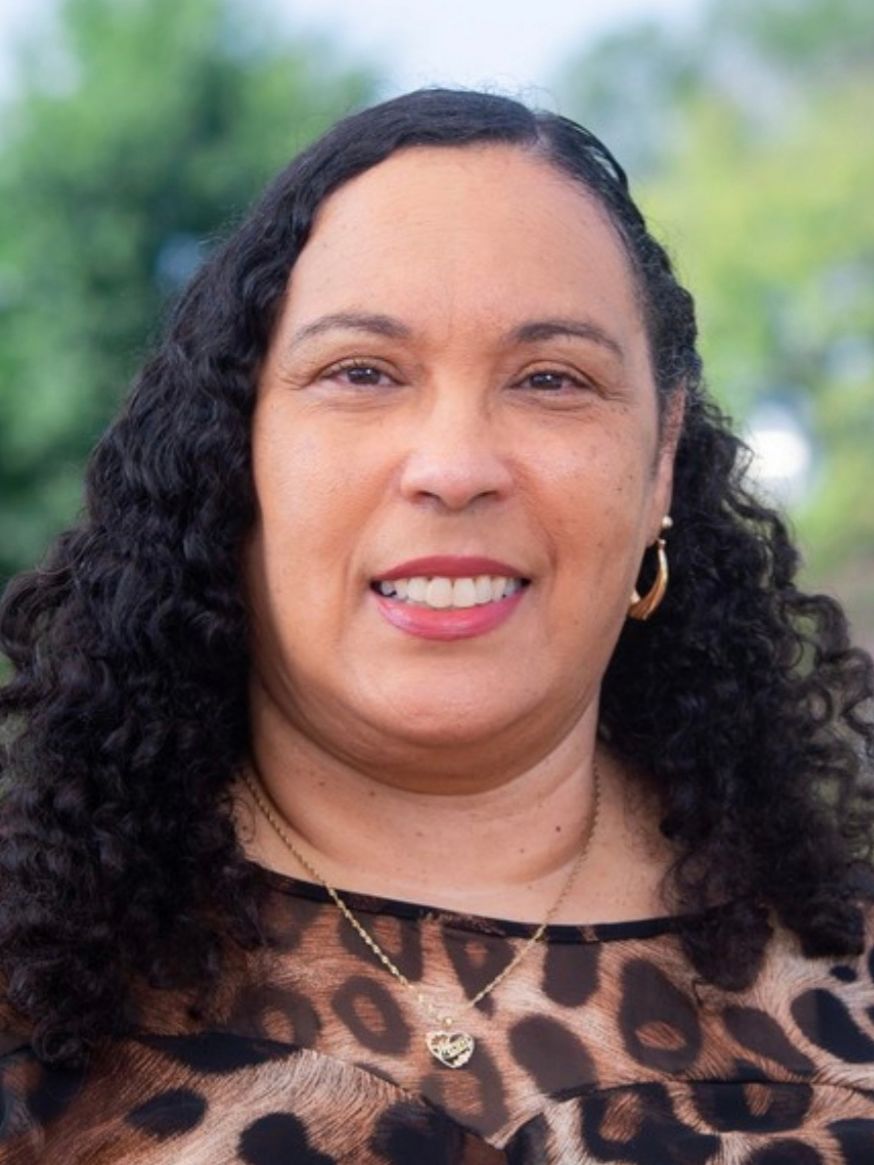
Dr. Roxanne Mitchell, Professor of Educational Administration
Dr. Roxanne Mitchell, Professor of Educational Administration
Alabama Department of Education announces partnership with Saban Center
Education facility will serve as regional hub for interactive STEAM and workforce experiences
As a city that is always progressing and expanding, Tuscaloosa often brings new selections of locations, businesses, and activities to the community and visitors. Soon, it will be able to add a state-of-the-art educational facility to those selections.
With plans to be operational by 2026, the Saban Center will be an innovative science, technology, engineering, arts, and math hub that immerses visitors in hands-on learning experiences. It will also introduce local and regional students to some of the various career opportunities that await them in the STEAM field as well as serve as a professional development space and lab for educators. IGNITE, formerly the Children’s Hands-On Museum, and Tuscaloosa Children’s Theatre will be housed in the center as well, ensuring that it features something enjoyable for everyone.
“We pitched the idea of doing something remarkable for our children,” Mayor Walt Maddox said during a recent press conference. “I don’t know if any of us could have dreamed that we would be at this point. But, if I remember anything about that meeting, when I told (Terry Saban) it was going to be a center of excellence, she said ‘Walt, excellence is not good enough. It has to be elite,’ and that’s the standard we want to meet for our young people.”
Local entities helping to make this venture possible include Nick and Terry Saban, the Tuscaloosa City Council, and the Tuscaloosa City Board of Education.
The scope of the project has enhanced even more with the State of Alabama declaring the Department of Education's partnership with the Saban Center.
“I am a firm believer in getting our students in real-life experiences,” Gov. Kay Ivey said during her State of the State address on March 7 as she announced the collaboration. “In this modern economy, I also highly value STEM education, and learning must not stop at the classroom door.”
Ivey pledged $25.5 million in capital funds to support the discovery center, including $2.6 million over the span of 10 years for operations, according to an article on the Tuscaloosa City Schools website.
“Understand that this community and our state working together has risen to the occasion in making certain that every child in Alabama has their shot at an American dream,” Maddox said.
In a March 30 video announcement, Maddox and Terry Saban shared that The University of Alabama, Alabama Power Foundation, Coca-Cola Bottling Company UNITED, Mercedes-Benz, and Parker Towing have also joined as partners of the center.
“The University of Alabama is proud to collaborate with (the) Saban Center and the City of Tuscaloosa,” UA President Stuart R. Bell said in a statement on the center's website. “The initiative will extend UA’s outreach to K-12 students as part of the Capstone’s teaching, research and service mission, and the Center will enhance STEM education in our state for children who will one day be professionals in our communities.”
The Saban Center will be built in the coming years on the site of the former Tuscaloosa News building as part of the city’s Elevate Tuscaloosa initiative. Through this initiative, the city is investing in projects aimed to improve its education, cultural arts and tourism, parks and recreation, and connectivity, according to the Elevate Tuscaloosa website.
“Our mayor, Walt Maddox, and our city council, it was they who determined that our children deserve a quality discovery center. It was they who determined that Tuscaloosa Children’s Theatre deserves a home,” Terry Saban said. “They are the ones that ignited this whole project, and it has gone from a spark to a roaring conflagration.”
The Sabans have been key in helping the city get this project off the ground. Some other individuals involved include State Finance Director Bill Poole, State Superintendent Eric Mackey, Chief Operations Officer Brendan Moore, Tuscaloosa City Schools Superintendent Dr. Mike Daria, Saban Center Director Audrey Buck, and local educators.
“This project, I think, is something that may be one of the most significant things that we’ve ever been involved in since we came to Tuscaloosa 16 years ago,” Nick Saban said. “I think it’s going to create a legacy that will affect so many people for a long, long time, and really, it’s not much different than what we ask our football players to do. When we can create opportunities for (young people) to have a lifetime of learning, that’s going to enhance their chances of being successful in the future.”
Saban Center Director Audrey Buck said it was important to those involved to prevent the mistake other U.S. science and discovery centers made by not including local schools in their planning process.
“We knew that we had to have our teachers involved from the very beginning in conjunction with IGNITE and TCT,” she said. “They would be our content experts to ensure that the IGNITE exhibits directly correlate with the Alabama curriculum. We set out to have the Saban Center be a true extension of the classroom.”
To make that dream a reality, Tuscaloosa City Schools Superintendent Dr. Mike Daria called on city school administrators to help organize a team of STEM-specialized educators. They have played an integral role in the planning process by generating ideas and exhibits that will pair directly with the state classroom curriculum. This ensures students' learning experience won't end at the Saban Center but will continue when they return to school.
“Understand that this community and our state working together has risen to the occasion in making certain that every child in Alabama has their shot at an American dream.”
The University of Alabama’s Dr. Lisa Fowler and Dr. Joni Lakin are two members of this team of educators who provided their professional knowledge of STEM learning.
“I think this is going to have such a huge impact on student learning, and not just learning, but student identity,” said Dr. Fowler, a clinical professor in STEM education and professional development as well as a specialist in elementary education. “I believe these experiences we’re designing are going to help students see themselves in a future they never imagined before, and that’s big.”
Dr. Fowler and Dr. Lakin are administrators of the newly formed Office of Interdisciplinary STEM Education Research (ISER), which promotes partnership between STEM researchers and education experts in the aim of advancing STEM education outreach. Dr. Fowler serves as the office’s executive director while Dr. Lakin is the director of research in educational studies.
“We have a STEM gap where females and minority populations are underserved, and we’re trying to close that gap,” Dr. Fowler said. “We’re hoping everybody sees a pathway into STEM that enters (the Saban Center).”
The pair helped create the proposal and plan exhibit content, with Dr. Fowler focusing mainly on professional development and curriculum space, and Dr. Lakin working in robotics and engineering planning.
As the team collaborated, Dr. Fowler said, a feeling of synergy was created immediately.
“Everybody in that room has the same common goal of creating greater interest, stronger knowledge based in STEM,” she said.
Another contributing member of the planning team is Woodland Forrest Elementary School's STEM Coordinator Taylor Lamon.
“It was rewarding to be chosen for it,” Lamon said. “Then to know you're doing something for a larger community and really getting to pour into your passion – (the educators) responded really well and worked really hard on it.”
The Saban Center will feature rotating exhibits, related in some way to manufacturing, in the following workforce areas: forms of energy, sports and the human body, earth and sustainability, as well as technology and robots. Having interactive exhibits that change on a regular basis will keep learning opportunities current and the technology updated.
The goal is to make students and visitors come back for “increasingly relevant experiences to the workforce,” said Dr. Joni Lakin, associate professor of Educational Research with a special interest in STEM learning.
“Whether (kids) want to be the mechanical engineer making the parts or the designer designing the car, the aesthetic parts – I think it's important for them to have this exposure and opportunity to connect classroom to potential workforce and career choices,” said Dr. Lakin, who also specializes in engineering education.
The team worked diligently to craft the STEM center proposal. When complete, it was sent to several influential individuals, including Terry Saban, the center administration, and the state department. After reading the plans, Terry Saban took a special interest in the project, as did the governor and the state superintendent.
The planning team did not expect the announcement of the state partnership, so when members were invited to celebrate their work at the Tuscaloosa Amphitheater on March 8, the news and the press conference took them by surprise.
“When we got there it was so much more,” Dr. Fowler said. “The proposal was referenced throughout everyone’s speeches because they were impressed with the work we’d created. It was very exciting because we didn’t know, and when educators know that their voices are heard, it is so validating.”
The support the project is going to receive from the state will ensure the Saban Center makes a permanent impact on education, Terry Saban said.
Another hope is that the center will attract more rural schools in the area or region to visit as well.
“I’m really hoping that the students who benefit the most are the ones who currently would not do a field trip or wouldn’t go to a STEM museum space,” Dr. Lakin said. “I hope that it’s really impactful for students who wouldn’t otherwise know about STEM careers or STEM opportunities in workforce development.”
Promoting education and creating career opportunities will be at “the Center of It All” for the Saban Center, which means a brighter future for Tuscaloosa, the state, and the region, as well as young scholars.
“All students have a pathway into STEM,” Dr. Fowler said. “All students have a place where they belong. We just need to help them see their potential and their capabilities.”
For more news on the Saban Center, visit sabancenter.org/news/.
Claire Major selected as 2022 Burnum Distinguished Faculty Award recipient
Dr. Claire Major presented her lecture titled Engaged Teaching: Enhancing Faculty Knowledge to Improve Student Learning on April 27 after being named the 43rd Burnum Distinguished Faculty Award winner.
“The 2022 Burnum award that we’re providing today,” University of Alabama President Dr. Stuart Bell said while presenting Dr. Major with the award, “is really aimed at recognizing one whose career over a period of time demonstrates exceptional achievement in the areas of research, in the areas of scholarship (and) creative activity, that we would all say, ‘Wow, this is a colleague we’re very proud of.’”
Many of Dr. Major's peers attended the lecture and the reception that followed in order to further congratulate her. Later that evening, an invitation-only dinner was held in her name at the UA President's Mansion.
“I am honored to receive The University of Alabama’s Burnum Distinguished Faculty Award. It is an important award, and I’m grateful that my work is being acknowledged in this meaningful way," Professor of Higher Education Dr. Major said. "I am also proud to be the first faculty member from the College of Education to receive this award. I’m looking forward to continuing my pursuit of excellence in teaching, research, and service.”
Dean Peter Hlebowitsh commended her on her remarkable scholarship, research, and accomplishments.
“Dr. Major has been moving heaven and earth for us for many years now,” Dr. Hlebowitsh said. “She is a distinguished scholar and a remarkable educator, as well as a seriously good and generous person. Our College has benefitted from her good work and from the wisdom and kindness that she brings to every interaction.”
Dr. Angela Benson, head of the Department of Educational Leadership, Policy, and Technology Studies, also lauded Dr. Major for her dedication and scholarship.
“Dr. Major is an outstanding scholar and engaged campus citizen who is most deserving (of) this award,” Dr. Benson said. “She sets the standard for excellence in teaching, research, and service across the campus. We are fortunate to have her in the department, the College, and the University.”
Dr. Benson called Dr. Major a friend in addition to a committed colleague.
“Everything that I know about professional development for faculty and encouraging faculty I got from (Dr. Major),” she said at the event. “... She has been a joy for me, and a model for me, and even a mentor for me, and there is nobody more deserving of this award than her."
With more than 30 years of experience in higher education, Dr. Major is a skilled professor, researcher, and author, having written the best-selling book “Collaborative Learning Techniques” and several others. Programs she has founded include the Alabama Community College Leadership Academy as well as an accelerated Ed.D. program. Dr. Major earned her B.A. here at UA and her Ph.D. and M.Ed. at the University of Southern California. She is currently working on a number of grant-funded projects, according to her website.
“This award, as (Dr. Hlebowitsh) mentioned, is for research, scholarship, and teaching, and I’m so excited that those aren’t separate. It’s not for one or the other … it’s for all of them,” Dr. Major said during her lecture. “I think of my work as scholarship, and it is scholarship on teaching and learning and how we can do it better. That’s what my research focuses on.”
The Burnum Distinguished Faculty Award celebrates the scholarly excellence of its recipients while highlighting their dedication to teaching. The educators selected have displayed brilliance in research and scholarship in addition to teaching throughout their careers. This prestigious honor recognizes their contributions while aiming to acknowledge the entire academic community as well as the community at The University of Alabama.
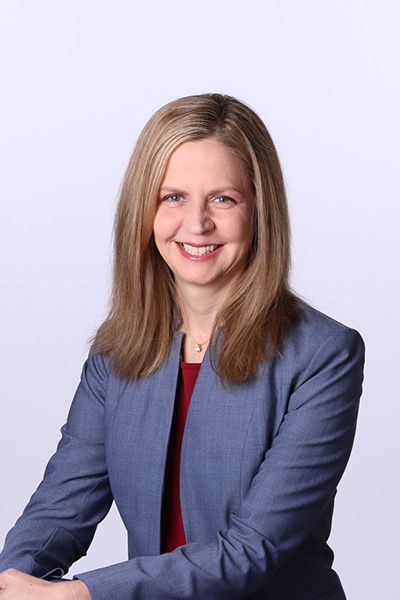
Dr. Claire Major, Professor of Higher Education
Dr. Claire Major, Professor of Higher Education
2023 College of Education Faculty and Staff Awards
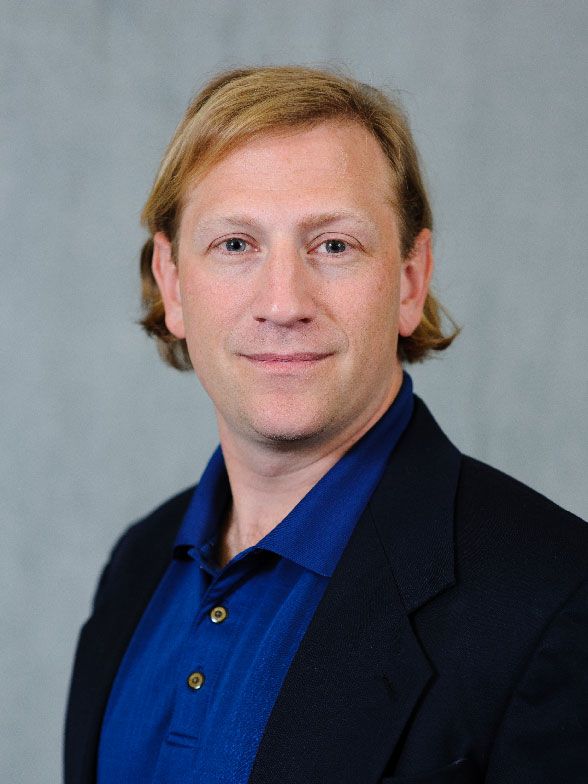
Nellie Rose McCrory Faculty Excellence Award for Research: Dr. Nathaniel Bray
Since arriving at The University of Alabama 19 years ago, Professor in Higher Education Administration Dr. Nathaniel J. Bray has demonstrated excellence as well as immense dedication to his work and his research. Dr. Bray’s expertise in research played a key part in helping the Education Policy Center – of which he serves as associate director – earn the ASHE 2016 Excellence in Public Policy in Higher Education Award. It also led Gov. Kay Ivey to recruit him for her taskforce that sought to incorporate the Achieves College Promise Program into the state. He has presented his Pell grant funding pattern research to the U.S. Senate Appropriations Staff twice and has contributed to numerous funded grants – adding to a total of more than $2.2 million in funding – several of which have served to progress higher education throughout Alabama.
Dr. Bray boasts a phenomenal total of roughly $2.7 million in funded grant work, which includes a State Apprenticeship Expansion Grant funded via the Alabama Department of Commerce, an Alabama Commission on Higher Education funded grant on Pell grants in Alabama, and another on the assessment of the STARS Transfer Articulation System Effectiveness. Throughout his career, he has given 47 national and international presentations and has an extensive collection of published work: 40 articles in refereed journals, two special editions of journals, nine refereed monograph chapters. Dr. Bray’s book Higher Education: Handbook of Theory and Research has been beneficial to academic departments in helping them make decisions related to tenure and promotion as it addresses the faculty-administrator relationship. Educating the Top 100 Percent: Policy Pathways for Public Higher Education, which Dr. Bray collaborated with Dr. Stephen Katsinas and Dr. Martha Kanter to write, was made readily accessible as a guide for policy makers by book publisher Harvard Education Press. Lastly, his book Oracle: The Research Journal of the Association of Fraternity Advisors won the Dr. Charles Eberly Oracle Award in 2017.
“He is a rare academician who has very deliberately chosen to ensure his work is steeped in practicality, informing policy and decision makers,” said Dr. Angela Benson, UA professor and head of the Department of Educational Leadership, Policy, and Technological Studies. Dr. Bray's work has impacted higher education across Alabama, and this honor recognizing his accomplishments and scholarly excellence in research is overdue and well deserved.
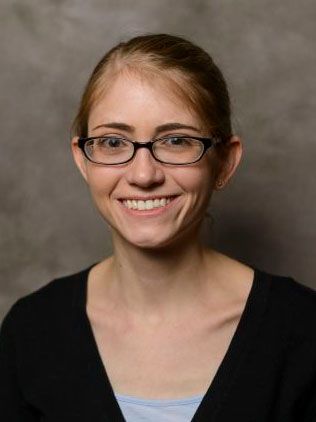
Nellie Rose McCrory Faculty Excellence Award for Teaching: Dr. Stefanie Wind
Dr. Stefanie A. Wind’s mastery of teaching is embodied not only in her accolades but in the glowing praises of her students and how she supports them. In addition to being an instructor, she is an academic advisor to graduate students, a mentor to advisees and research assistants, and a writer and co-writer of a variety of published works. Dr. Wind, UA Associate Professor of Measurement and Evaluation, has served as a guide in methodology to young scholars on numerous thesis and dissertation committees and as a UA representative in the Southeastern Universities Graduate Research Symposium. She won the 2019 Recognition of Excellence in Academic Advising honor from the Office for Academic Affairs and Academic Advisors Association, plus others, and contributes to curriculum development within and outside the University. Her commitment also extends to grants, as she has played a part in the funding of 10, totaling more than $10 million.
To thoroughly assist students in her statistics, measurement/psychometrics, and research methods courses, Dr. Wind uses various techniques that include fostering active learning, culturally responsive and inclusive teaching, as well as extensive and individualized feedback, attested Assistant Professor in the Department of Educational Studies in Psychology, Research Methodology & Counseling Dr. Wenchao Ma and Clinical Assistant Professor Dr. Wenjing Guo, also in the Department of Educational Studies in Psychology, Research Methodology & Counseling. “She is not only an excellent professor with a very strong statistical knowledge background but also a very thoughtful professor who cares about her students and knows exactly how to deliver her knowledge to them,” said Cheng Hua, a Ph.D. candidate in the Quantitative Methods program.
Dr. Wind proves her devotion to students time and time again by serving on numerous dissertation and master’s thesis committees inside the College of Education but in Engineering, Communication and Information Sciences, Human Environmental Sciences, and Arts and Sciences as well. Rong Zhang, a Ph.D. candidate in the Educational Leadership program, said, “It is due to Dr. Wind’s unwavering support and encouragement that I have grown from a hesitant first-year student, unsure of my place in the academic world, to a confident fourth-year student looking forward to a bright future in a field for which I have found my passion.” The words of Dr. Wind's students speak volumes to the impact she has made as a teacher.
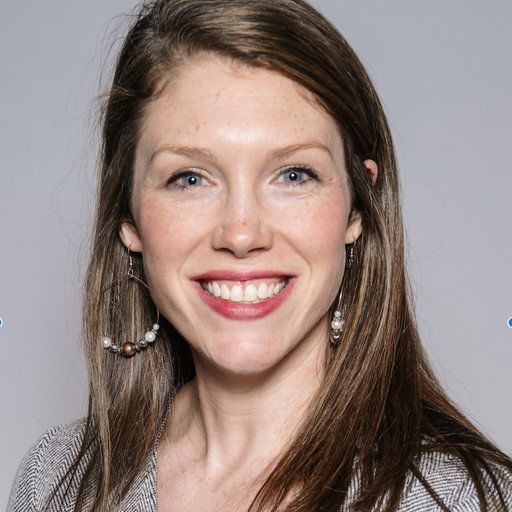
Nellie Rose McCrory Faculty Excellence Award for Service: Dr. Cailin Kerch
Clinical Assistant Professor of Elementary and Early Childhood Education Dr. Cailin J. Kerch works diligently to serve the College, the University, the community, and the state. Her hard work is split between instructing and serving in each of those capacities. This also includes working closely with Tuscaloosa City Schools as well as partnerships with the Alabama Department of Early Childhood Education (ADECE) and the Alabama State Department of Education (ALSDE). She serves on committees at both the state and university level, aiding in the addition of four grant-funded College staff positions, and has secured more than $879,000 in grant funding. Dr. Kerch personifies her mission of uniting, acting, and leading here at the University and beyond.
Currently, Dr. Kerch serves as the Governor’s Early Childhood appointee on the English Language Arts (ELA) Textbook Committee and the Alabama Department of Early Childhood Education (ADECE) Secretary of Education’s appointee on the Alabama Literacy Taskforce and took part in assessing a recent revision ALDSE made to the ELA K-12 guidelines. She was previously on ADECE’s Alabama Standards for Early Learning and Development Committee and co-chaired standard development for Birth to 5-year-olds for mathematics and social-emotional development. Dr. Kerch’s funded grants contributed to the creation of programs including The Early Learning Initiative at the Gadsden Center and two First Class Pre-Kindergarten classrooms at no cost for families.
During the COVID-19 pandemic, Dr. Kerch assisted educators and administrators in making the successful swap to virtual and remote learning. During this time, she also launched a Facebook group aimed at helping parents support their children's education while they had to learn at home. Through several of her early childhood courses, Dr. Kerch has spearheaded partnerships with local schools – including Southview Elementary and Central Elementary – giving students the chance to help out in classrooms, tutor children, and even provide family engagement nights. This gives young scholars firsthand experience that goes beyond their required certification hours. “We teach our COE students to unite, act, and lead," Dr. Kerch said. "I seek to embody this mission by serving our state and local communities as a partner, scholar, and advocate for early childhood educators, children, and families." She has done exactly that.
STARS Program rebrands as Alabama Transfers, relaunches with upgrades
Updates to system and website aim to better assist prospective transfer students
Transferring to another college or university can be nerve-racking enough without the additional stress of worrying about whether coursework credits will transfer or apply successfully to your major of choice. Needing to retake classes doesn’t mean just losing course credits – it means losing time and money. If this happens, transfer students also run the risk of losing scholarships or graduating late.
To alleviate these issues, the Alabama Legislature created the Articulation & General Studies Committee (AGSC) in 1994 through Act 94-202. The AGSC is made up of voting members representing The University of Alabama System, Auburn University, the University of South Alabama, Alabama State University, and Alabama A&M University in addition to regional universities and two-year colleges in the state. Since then, the committee has integrated, and continues to monitor, an Alabama-wide general studies and articulation program with the goal of streamlining the transfer of course credits among the state’s public higher education institutions.
In 1998, the AGSC also launched an online database, inspired by Troy State University’s computerized advisement system, called the Statewide Transfer and Articulation Reporting System (STARS) Program. STARS informs and directs prospective transfer students by showing how their earned coursework applies to a specific career path at a particular public university or college and allows them to create a transfer guide based on that information.
Though the STARS Program and its website were state-of-the-art at the time, over the years it became apparent that they needed updates to better suit the changing needs of students as well as advancements in technology.
As anyone visiting the site recently has surely noticed, the site has made some major updates since last year, debuting a new look and a new name. The STARS Program relaunched as the Alabama Transfers Guide System in November, boosting the accessibility of the website and further simplifying the transfer process between public higher education institutions for students.
As the number of Alabama transfer students continues to climb – and as they less frequently move just from a community college to a four-year college or university – it has become even more imperative to lessen, if not eliminate, instances where course credits are lost. The relaunch also focuses on providing students that security.
“Alabama Transfers will help students and parents save time, credits, and money,” said Alabama Transfers Principal Investigator and University of Alabama Education Policy Center Director Dr. Stephen Katsinas. “(It) will create a more transparent system that prevents credit loss in the transfer process, so more students get through college and into the workforce, as Alabama businesses cry out for skilled workers. Alabama Transfers is opening doors to thousands by eliminating unnecessary credit loss as students transfer.”
The AGSC and Dr. Keith Sessions, executive director of both AGSC and STARS, hired the UA Education Policy Center to re-evaluate the STARS Program from 2014-2016, during which Dr. Katsinas, Dr. Nathaniel Bray, Michael Malley, and other UA EPC members conducted an in-depth statewide assessment.
The UA EPC submitted its final AGSC & STARS Evaluation report to the AGSC in September 2016 with multiple recommendations for improvement, including upgrading the website, addressing Area V (or pre-professional curriculum) concerns and information gaps, as well as working with universities to update their Area V pages.
“From that evaluation and that relationship forged by Dr. Katsinas, Dr. Nathaniel Bray, and Mike Malley at the time, Dr. Sessions really began to rely on the Education Policy Center for guidance in how to fix the problems uncovered in the evaluation,” Alabama Transfers Program Manager Brandi Stacey said. “So that’s how the Alabama Transfers project came about.”
The project has included the overhaul and rebranding of the program and website – progression efforts supported by both previous UA Office of Academic Affairs Provost Dr. Kevin Whitaker and current Provost Dr. James Dalton.
“The University of Alabama is pleased to support the College of Education’s efforts to strengthen transfer pathways between our state's community colleges and our university, as we seek to become the destination of choice for community college students statewide,” Provost Dalton said.
Alabama Transfers Project Coordinator Mike Malley and technical staff at the UA EPC developed website enhancements that will better assist students but their college and university counselors and administrators as well. Some of these redesigned features include an easier-to-navigate dashboard, interactive spreadsheets that can be saved and updated, majors sorted by interests rather than specific degrees, course equivalencies between colleges, detailed college-to-career pathways, and more.
“The most important part is serving up the information that students need to transfer and making it accessible and easy to understand,” Stacey said. “We want to remove any barriers along the transfer pathway that we can for students. That road is bumpy enough.”
Prospective transfer students can continue to use the Alabama Transfers site to create an official transfer guide based on their career interests, then submit it and establish a legal transfer agreement with their institution of choice. Doing this will help make sure students keep their earned credits and that they will apply to their degree when they do transfer.
“What’s been done with this overhaul is the ability to say, ‘Here are the credits I have. What fields can I go into, and where do they transfer to?’ You don’t have to know the endpoint when you walk in to know what your options are,” said Dr. Nathaniel Bray, co-principal investigator for Alabama Transfers and associate director of the UA EPC. “With Alabama Transfers, you can say, ‘Here’s where I am. What are my possibilities?’ And it’s built out in much more detail to say, ‘You can do this or this, and here’s where you can do those things.’ It completely has shifted the way people can use Alabama Transfers to consider their future.”
Simplifying and ensuring the transfer process runs as smoothly as possible will financially benefit students and their families in the long run. Current and accurate information available on the Alabama Transfers site will help them avoid wasting time and money on courses that don’t fit into the student’s goals, Stacey said. This is especially important for those with lower incomes or financial aid, such as Pell Grants.
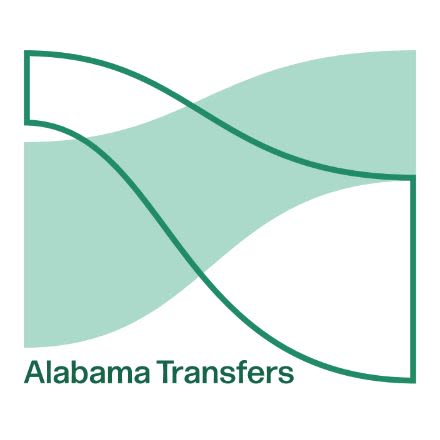
“Our refrain that we say all the time is, ‘Save students time, credits, and money,’” she said. “We don’t want students to get lost on the transfer pathway, and we don’t want them there longer than they need to be. We want to get them through, get them graduated, and on to the successful lives they want to lead.”
Mapping out important degree details could make the difference of graduating within a shorter time frame or keeping some students from losing hope and stopping their education. More graduates entering the workforce means raising the number of credentialed workers in Alabama and helping the economy.
“That's probably one of the biggest pushes in the state right now is to increase the number of adults with credentials, and we recognize that doesn't always mean a four-year degree, and you don't always need a four-year degree to have a great career especially in some of the faster-growing career areas in Alabama,” Stacey said. “Another big push from the Alabama Community College system is reaching back to students who have stopped out or dropped out and re-engaging the over 500,000 adults in the state of Alabama who have some college and no degree.”
Improving degree completion not only saves taxpayer dollars but is the goal of the act responsible for creating the AGSC in the first place, according to the UA EPC’s 2016 evaluation report.
“We know a lot of folks get a salary increase for completing a credential, completing a degree, and we also know that the enrollment at community colleges much more mirrors our state than we see our flagship institutions,” Dr. Bray said. “It provides for a lot of social economic and racial diversity opportunities to kind of move forward mobility-wise, so we know that all those things are beneficial as well.”
Since 1998, Alabama Transfers (or the STARS program) has supplied 900,000 students with 1.5 million transfer guides, and there are more than 160 different major guides currently available to students. The AGSC has convened more than 160 times and approved more than 1,200 general studies courses for transfer. The committee and Alabama Transfers also collaborate with more than 400 faculty and staff volunteers from two- and four-year colleges and universities.
Of the prospective transfer students who have used STARS since 1998, 327,543 said they were interested in transferring to UA – of that number, 175,377 specified UA as their first choice while 152,166 listed it as their second, according to data from Alabama Transfers.
“Alabama Transfers is one of many examples of the statewide leadership provided by The University of Alabama's College of Education to the citizens and taxpayers of the State of Alabama,” College of Education Dean Dr. Peter Hlebowitsh said.
Staff at the UA EPC continues to assist with adjustments and updates to the online system as well as with Alabama Transfers marketing and training efforts across the state after the rebranding, Dr. Sessions said.
“The UA EPC has not charged us any fees for their help (or) service over the last six to seven years. For this we are truly grateful,” Dr. Sessions said. “We could not have done half of what has been accomplished over the last seven years without the guidance and help of the UA EPC and the UA Office of the Provost.”
To help promote partnership among all four-year institutions, the AGSC began hosting annual meetings based on transfer student success called the ACHIEVE Transfer Student Success Conference.
According to the Alabama Transfers website, the conference has three focuses: “promoting transfer student success, fostering collaboration between community colleges and universities to increase college completion rates in Alabama, and discovering new ways to achieve seamless transfer.”
The conference unites 200-250 people from across the state – “anyone who cares about transfer student success,” Stacey said, from higher education frontline student support workers to provosts and presidents – to host sessions and share information with one another.
Stacey has served as the chairperson of the ACHIEVE Conference Sub-Committee for the past three years and said they’re just getting started.
“I really feel like we've been able to foster a more cohesive transfer student success community within the state of Alabama,” she said. “(It’s) an annual event that we think really helps foster the goodwill and the collaboration among the institutions, and it's a great platform for us to elevate the website and magnify the changes that’ve been made.”
This is just the beginning for Alabama Transfers, too, as the work to move even closer to completing its mission continues.
“Our next step is to look into the establishment of regional Alabama Transfer offices (located across the state) to better serve the transfer needs of students, community colleges, and universities in different regions,” Dr. Sessions said, adding that office staff would be located in strategic, regional locations called coordination centers. “We are in the early phase of this project.”
Despite limited staff and a limited budget, the AGSC, UA EPC, and Alabama Transfers are indeed working hard to save students credits, time, and money, as well as to improve and ease the process for transfer students as much as possible as their degree paths become more multidimensional.
“I hope that it's very impactful – that is our hope with the program,” Stacey said. “Our hope is that it empowers students to have the information that they need before they transfer and to feel more secure in their decisions, to have a better game plan, (and) to better get their ducks in a row.”
For more information on the Alabama Transfers program, please email brandi@alabamatransfers.com or visit alabamatransfers.com.
More Faculty and Staff Awards
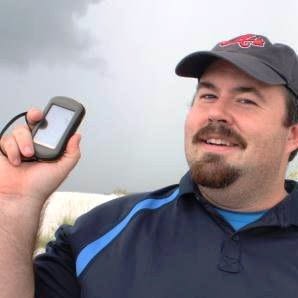
Staff Council Professional Excellence Award: Dr. Robert Mayben
Mayben has served as the Alabama Technology in Motion specialist for the College of Education’s Inservice Center since 2004. During this time, he has provided innovative professional development and training on the topic of technology integration into the curriculum to thousands of teachers, administrators, librarians, and other educators throughout the 13 school systems served by the Center. He has designed/delivered numerous professional learning opportunities for teachers across the state as well. He is currently part of a team of educational technology specialists who are facilitating a digital literacy and computer science academy for over 100 elementary educators throughout Alabama. He also guided the development of the Connecting Computer Science across the K-5 Curriculum online course to help elementary teachers meet the requirements of the State of Alabama’s new mandate for the instruction of computer science and computational thinking for every K-5 student in the state.
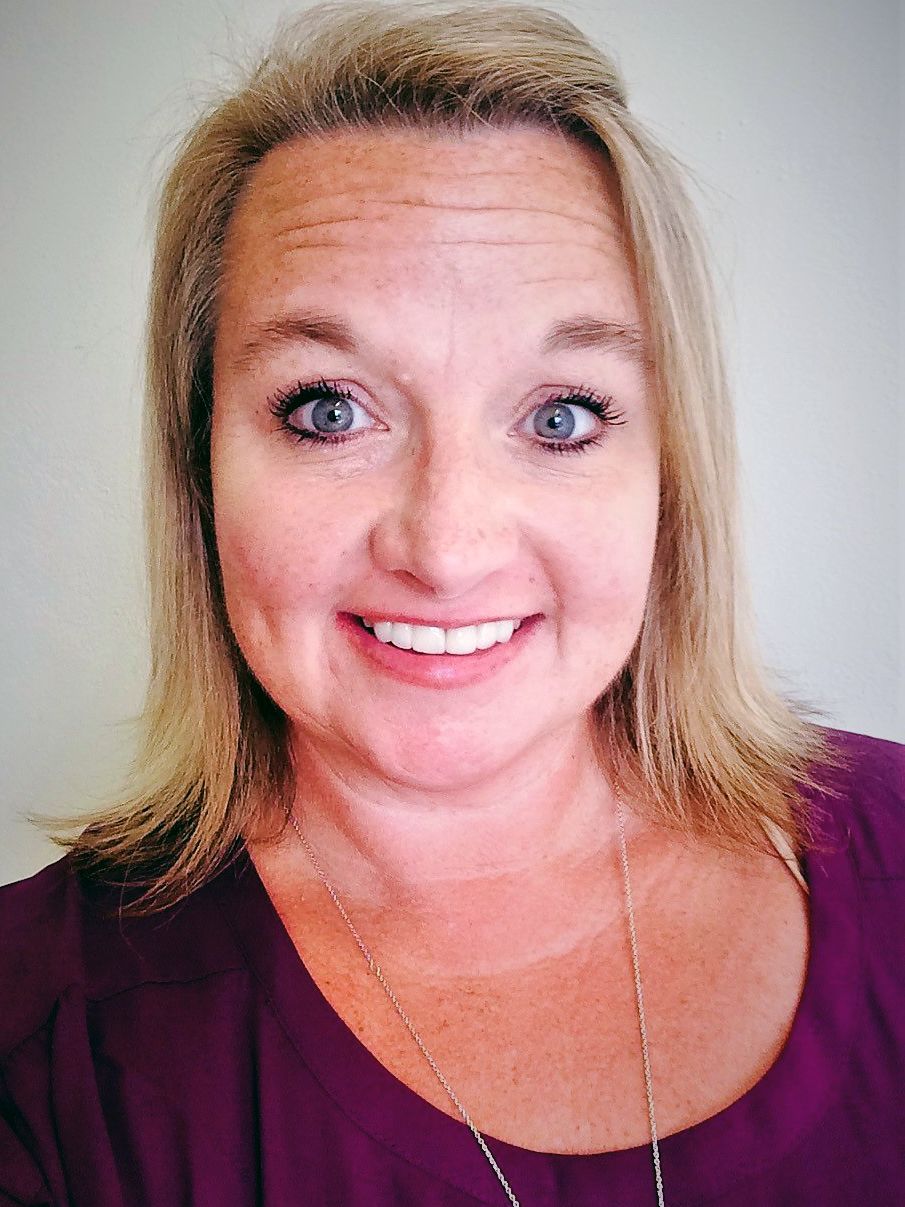
Staff Council Professional Excellence Award: Michelle Estes
Michelle Estes started with the College in 2018 as administrative specialist. She has been an integral member of the College of Education Dean’s Office, coordinating classroom schedules for all departments. This is no easy task as it’s like herding cats, as they say. Addressing the needs of each department, each faculty member, and each staff member is her daily life, and she does it with professionalism, grace, and community building. She is the first person you see when entering the dean’s office, and she helps all who enter. She is the epitome of considerate, supportive, and accommodating. Michelle has proven invaluable to the College and is very much appreciated. She was also selected by her peers to serve on Staff Council to represent the Dean's Office staff.

W. Ross Palmer Service to Students Award: Dr. Laura McNeill
McNeill has been employed by the College since 2015-2016. She employs continuous improvement in her instructional preparations and ensures that course concepts match the learning, training, and professional development needs of both education and the marketplace. Her efforts to assist students are evidenced by her commitment to creating “real-world” student internships, ones that have proven to provide her students with a competitive employment advantage. Students were proud to share their selection as an intern with premier organizations when McNeill launched the IT Student Internship in 2022. She initiated, planned, and created the internship, securing partnership locations, including the Cracker Barrel corporate headquarters (Fortune 500), the UA Office of Teaching Innovation and Digital Education (OTIDE, formerly CCS), ACCESS, and the UA Office of Compliance. To date, 18 students (MA and Ph.D.) have participated in and benefited from this professional experience.
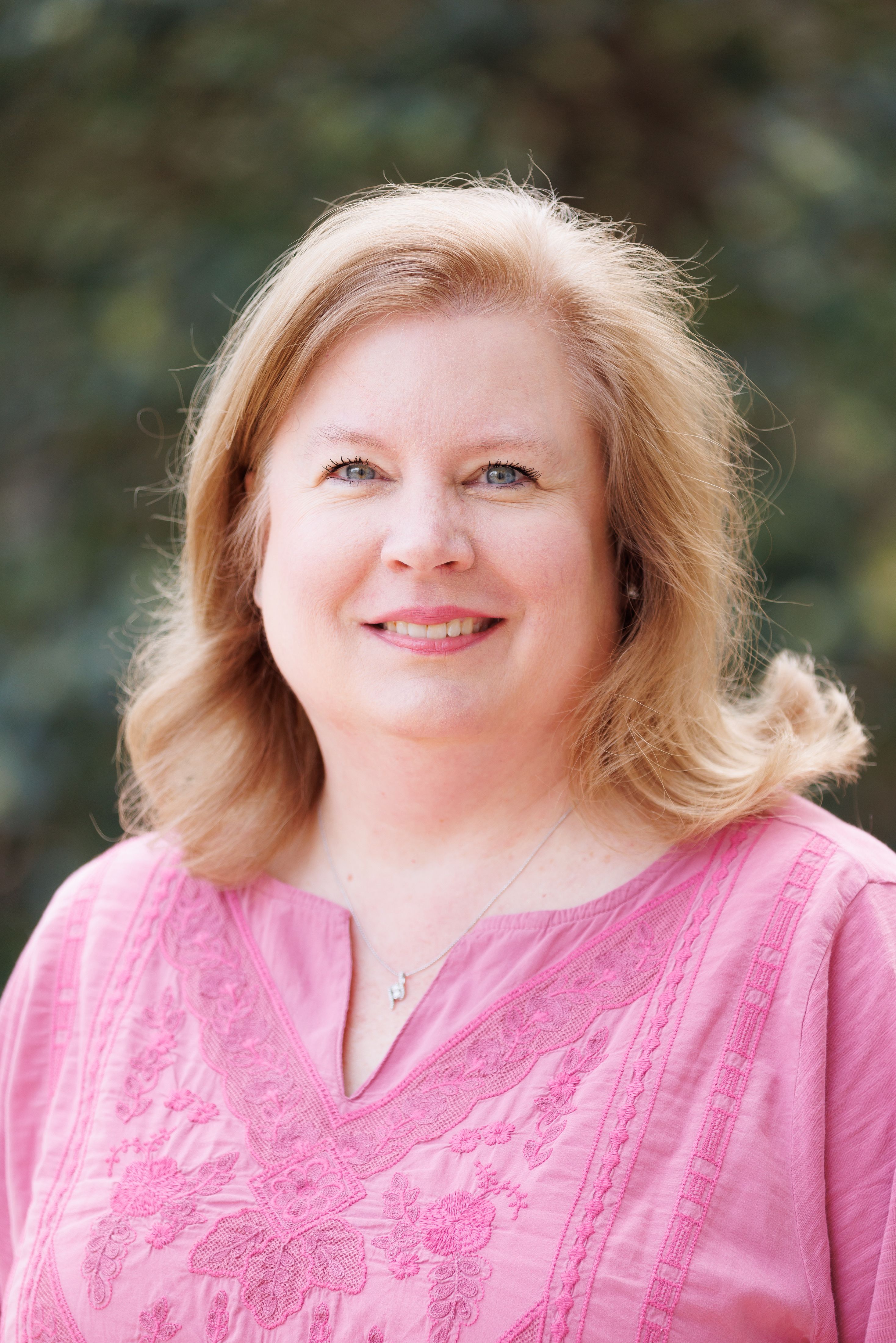
W. Ross Palmer Service to Students Award: Dawn Bryant
Dawn has worked for the College 12 years, and her deep concern for the success of our students is apparent in her commitment to them. Students entering our graduate programs quickly learn to trust her due to her vast knowledge and close attention to detail. She has a sincere interest in helping aspiring teachers reach their educational goals. Being a mother of two, and having a son graduate from the University, has enabled her to view issues from a parent's perspective. Her concern for all students is genuine, and it shows in the care that she takes to help them be successful. Not only does she assist them with the application process, making sure they meet all requirements for admission, but she follows them throughout the program, ensuring everything is in order for graduation and certification. Dawn's devotion goes far beyond the description of her job duties. She works hard to ensure that each individual student is given the attention needed for success.
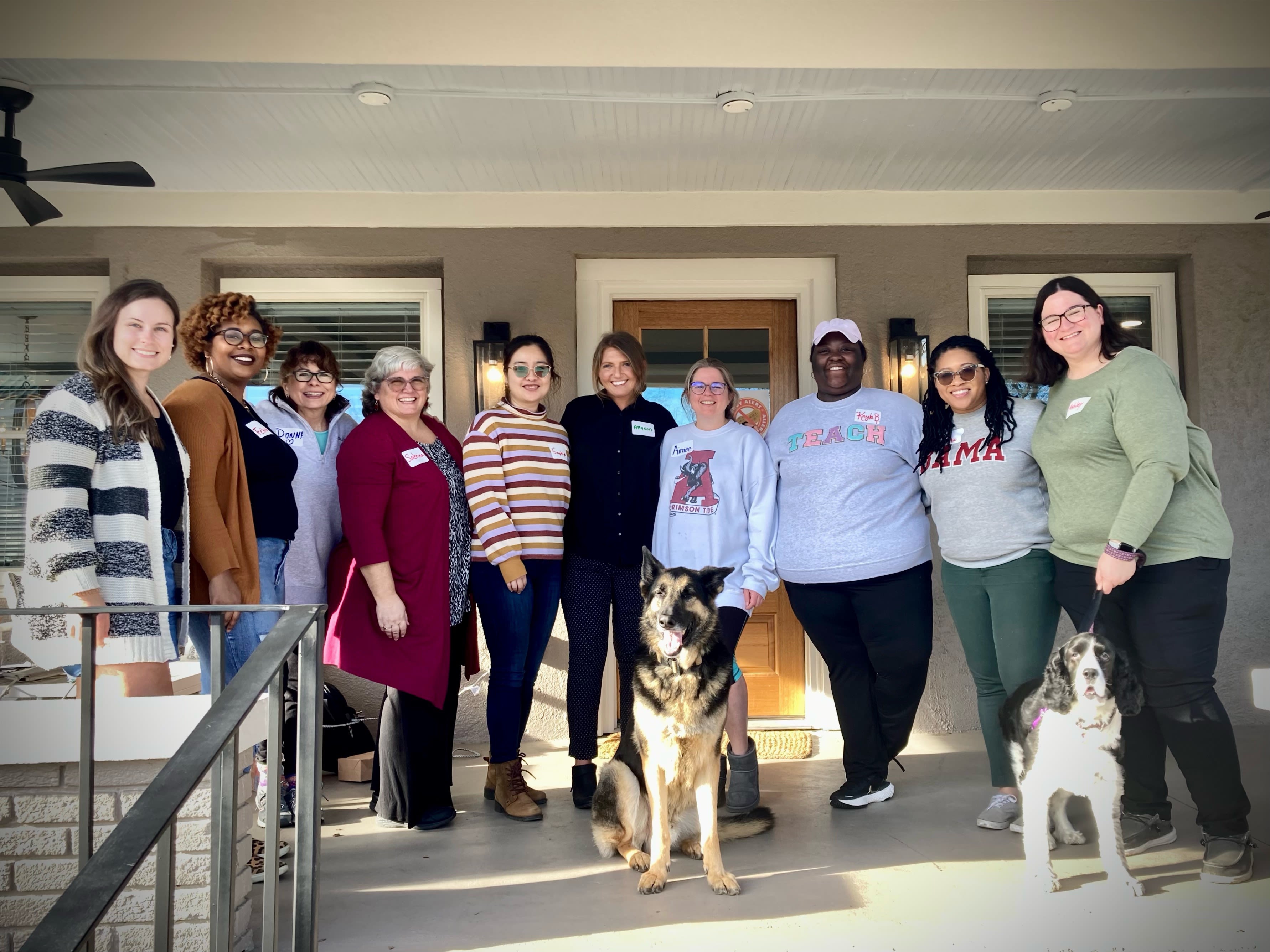
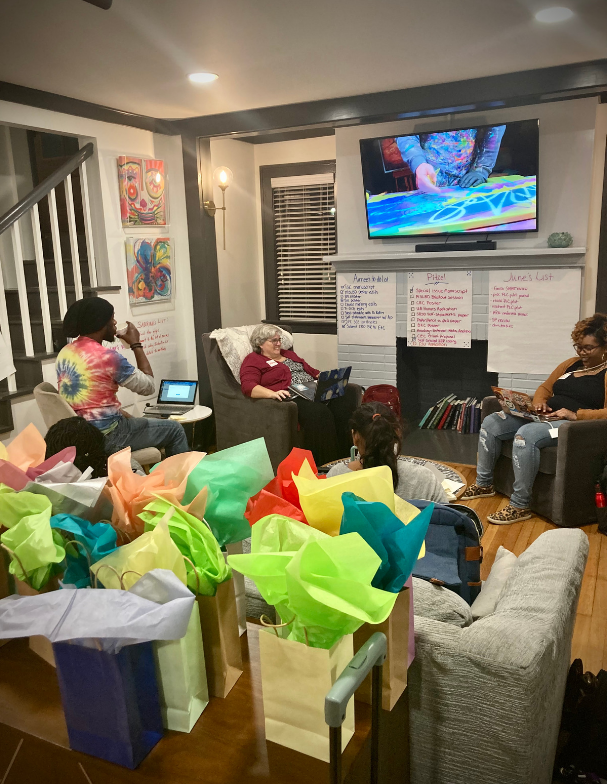
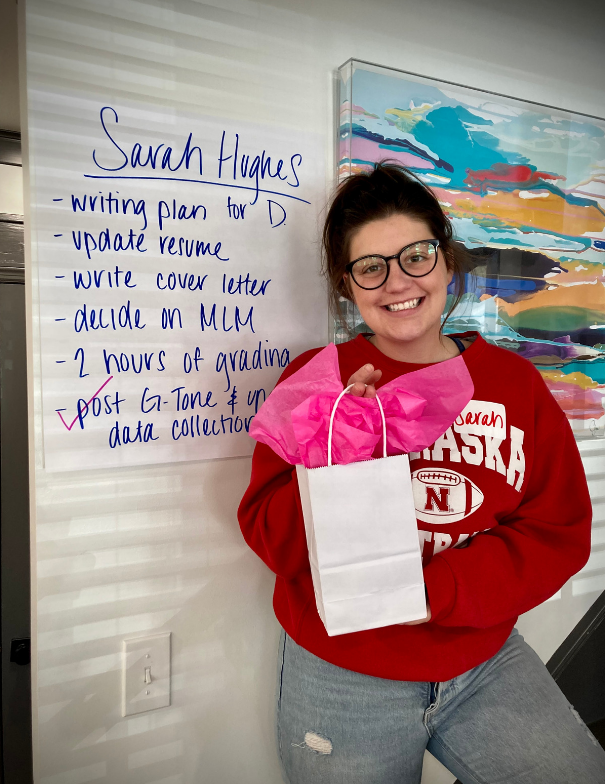
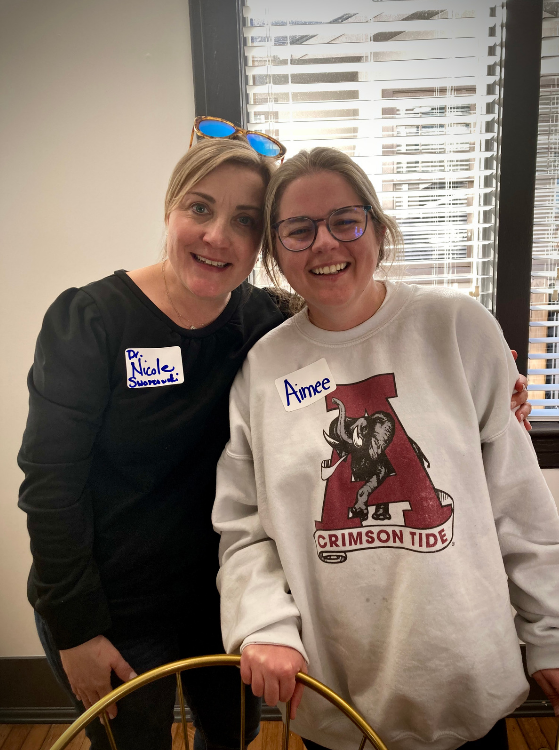
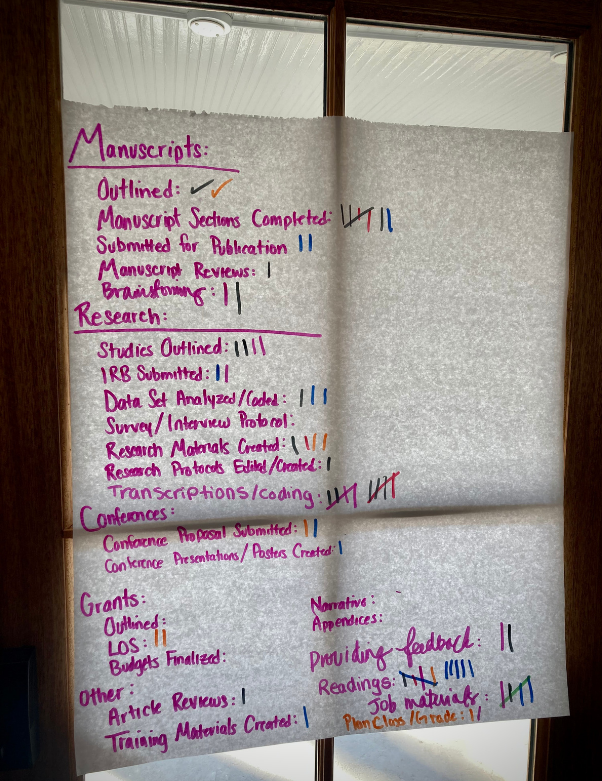

Top row, from left: Kristin Johnson, Felicia Smith, Donna Smith, Sabrina Stanley, Sophia Xiong, Allyson Pitzel, Aimee Hackney, Kayla Ballard, Chalandra Gooden, and Ashley Virgin; bottom row: Kingsley (writing support dog), Pearl (writing support dog)
Top row, from left: Kristin Johnson, Felicia Smith, Donna Smith, Sabrina Stanley, Sophia Xiong, Allyson Pitzel, Aimee Hackney, Kayla Ballard, Chalandra Gooden, and Ashley Virgin; bottom row: Kingsley (writing support dog), Pearl (writing support dog)

Amon Neely, Sabrina Stanley, and Felicia Smith are seen working on their laptops with their to-do lists hanging beside them, as Chalandra Gooden and Shradha Babu, sitting on the couch, work on their projects.
Amon Neely, Sabrina Stanley, and Felicia Smith are seen working on their laptops with their to-do lists hanging beside them, as Chalandra Gooden and Shradha Babu, sitting on the couch, work on their projects.

Sarah Hughes Berheim stands in front of her writing to-do list while holding up her encouragement bag.
Sarah Hughes Berheim stands in front of her writing to-do list while holding up her encouragement bag.

Dr. Nicole Swoszowski (faculty member) and Aimee Hackney.
Dr. Nicole Swoszowski (faculty member) and Aimee Hackney.

This list shows everything that was accomplished during the Doctoral Student/Candidate Writing Extravaganza.
This list shows everything that was accomplished during the Doctoral Student/Candidate Writing Extravaganza.
Writing event gives doctoral students sense of community, boosts productivity
After taking part in Dr. Kristine Jolivette’s writing events for College of Education faculty, Allyson Pitzel couldn’t help thinking a similar experience would be beneficial for the College’s doctoral students and candidates as well. Even attending one day of these retreats gives participants a sense of the community and support system that exists within the group – not to mention a firsthand look at the progress that can be made on writing projects at the same time.
“I love the writing days. I've always gotten so much done there, and I just like networking and building that community,” said Pitzel, a Special Education and Multiple Abilities doctoral candidate and Project INSPIRE fellow. “I talked to Dr. Jolivette and was like, ‘Hey, can we do this for College of Education students, the doc students and doctoral candidates?’ So, I was able to kind of mimic what she did for faculty.”
Those faculty writing sessions hosted, and personally funded, by Paul and Mary Harmon Bryant Professor of Education Dr. Jolivette are what Pitzel modeled the doctoral student and candidate writing group around. Events like this not only motivate attendees to be productive and get work done, but they also help create an environment where the attendees can feel comfortable and supported while writing.
Dr. Jolivette said she was thrilled when Pitzel proposed the idea of hosting a day of writing for students.
“It's great to see what we've been able to do with faculty and make them supportive, productive, and (form) a sense of community and then parley that to our doctoral candidates and students who are the next generation of us,” she said. “I was very excited when Allyson approached and said, ‘Hey, let's bring this to doctoral students and candidates.’”
Co-hosts Pitzel, Dr. Jolivette, Dr. June Preast, and Dr. Sara Sanders collaborated to make the Doctoral Student/Candidate Writing Extravaganza a reality, renting a two-story house with plenty of space and inviting doctoral students to attend Feb. 13 from 9 a.m. to 9 p.m. Thirty students showed up to participate – along with some faculty mentors – able to come and go as needed while making progress on dissertations, manuscripts, or other projects.
“A common theme among grad students who started (during the COVID-19 pandemic) was, ‘OK, we feel so isolated,’ because there was none of that face-to-face interaction,” Pitzel said. “I think creating a space where people can get together, write, ask questions was really important just to fulfill some of those things that we weren't able to get in the beginning.”
Upon entering the house, everyone was given a name tag and a big sheet of chart paper, encouraged to create their own writing to-do lists and work through them, checking items off as they were completed. The lists were hung up on the walls of the house. As tasks got marked out, the others in the group would cheer each person on. After accomplishing their writing tasks, the doctoral students received a small encouragement bag with some fun things inside, such as sticky notes, gift cards, and fidget items. Writing support dogs were also at the event to help their owners and other students de-stress if they felt overwhelmed at any point.
The co-hosts made a conscious effort to let attendees know they were welcome and in a safe environment, which can help everyone feel at ease and more willing to assist one another and ask questions if ever they were stuck.
“I think one of the things we heard was that, from a doctoral student and doctoral candidate perspective, it's really scary to approach other faculty. You've heard of these people, they might have similar interests, or you've heard that they're a good mentor, and you just don't have the avenue or the venue to approach them in a safe space, so I think that's something that was created,” Dr. Jolivette said. “People were able to be vulnerable and say, ‘These are things that I need. Can you help me with this?’ or ‘I'm struggling with this,’ to the successes of, ‘Oh my gosh. I did not think I could get it done, (but) I sat down and did it.’”
At least one person from each department in the College stopped by during the day to work on something, the co-hosts said, and students chose their own space inside, or outside, the house where they would hunker down and start writing, giving them “that flexibility to really shine and maximize (their) engagement.”
“There is a dire need for our doctoral students to feel that they have a community so they're not working in isolation.”
“(The students) said they got a lot done, and they want to do it again. They really enjoyed that sense of community and having people to bounce ideas off of and everything,” Pitzel said. “It was a nice way for them to find a space, get work done, and connect with people across departments.”
Assistant Professor in School Psychology Dr. Preast brought up one moment where a doctoral student in music education completed a task and just so happened to receive the goody bag containing a kazoo, bringing laughter and adding to the enjoyment of the day.
“I think for me, even though this was much more student-focused, it still provided that sense of community across faculty and students,” she said. “I love seeing the students from the wide range of programs that we had. I also, just as a mentor, love seeing students get excited about research and the work that they're doing, and that was palpable in in their tasks … there was an energy there, and I think that was really fun.”
Assistant Research Professor Dr. Sanders described the event and the feeling of community it provides a “cup-filler.”
“When it's done, it’s like, ‘Oh, I really did need my cup filled like that,’ because there’s that sense of community and that sense of you get stuff done, you do it a fun way, you do it with people who like the same things you like,” she said.
Lunch was provided for the group by the Department of Special Education and Multiple Abilities, and two professors cooked dinner that evening. The co-hosts agreed that mealtime helped further bond everyone and inspire conversation.
“There was a lovely discussion about imposter syndrome after dinner, with people just kind of (saying), ‘I don’t feel like I belong sometimes,’ and other people being like, ‘Well, I feel like that too, but it doesn't mean we don't belong,’” Sanders said. “I think that (during) the mealtimes especially, because we treat it as like a communal break where people can come together and just kind of chat, there was a lot of lovely encouragement during those times, too.”
Dr. Jolivette said the doctoral student and candidate writing day would more than likely be an annual event, due to it being personally funded, but that she and the others would love to host one this summer if possible. If at some point the writing days were to be funded by the College, they are more liable to be held each semester.
“There is a dire need for our doctoral students to feel that they have a community so they're not working in isolation,” she said. “One of the great things to observe throughout that 12-hour day (was) some people were there the full 12 hours and later because they got so much done. … They also were able to bounce off ideas and learn that there are others out there who have common interests or were at the same point in their career during their doctoral program. I think that's just something that's really needed.”
As the special education representative on the Graduate Student Organization Board of Representatives, Pitzel will step down from her role once she earns her doctoral degree, but she said two students who were at the writing day event, who will also be part of the Graduate Student Organization, expressed their interest in continuing the writing event if possible.
“I think it's something that should be built into our support for doctoral students across programs,” Dr. Jolivette said. “To have the organization, have some members who were there … they could see the possibilities and do different riffs on it to keep that momentum going, because it obviously was beneficial.”
Pitzel, Dr. Jolivette, Dr. Preast, and Dr. Sanders have only heard positive feedback about the graduate student and candidate writing day, with some participants still being a little surprised at all the work they were able to accomplish. Pitzel said she tweeted about the progress the 30 students made that day and had people on Twitter replying with things like, “Oh my gosh. Doc students were able to accomplish this in a day? That's so cool.”
“We did give a survey after (the event),” Pitzel said. “Some people wrote their comments, which was really nice to see… just ‘Would (you) be interested in this? What did (you) get out of it? Is there anything we should change?’ And I don't think anyone said they would change anything, so I was like, ‘OK!’”
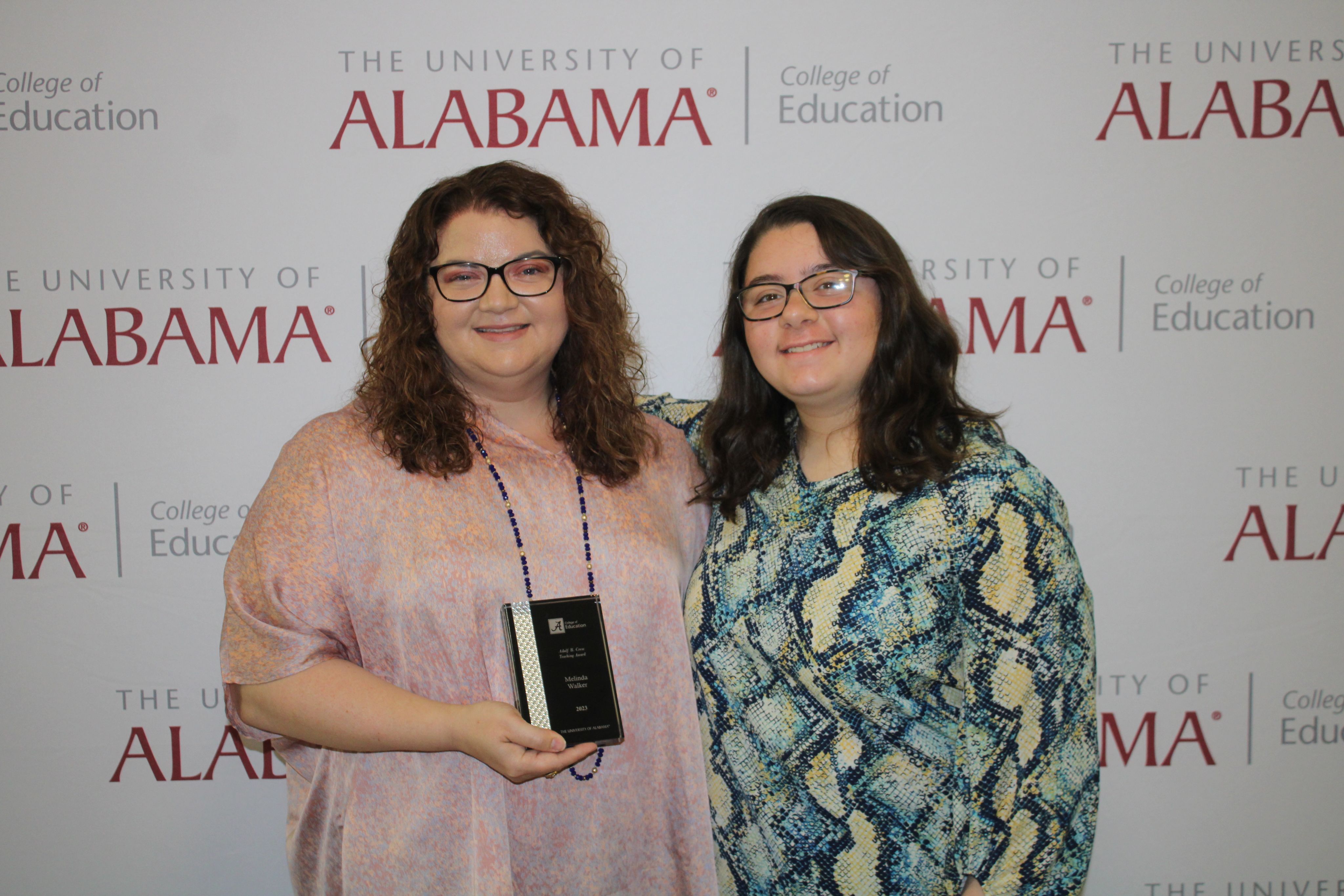
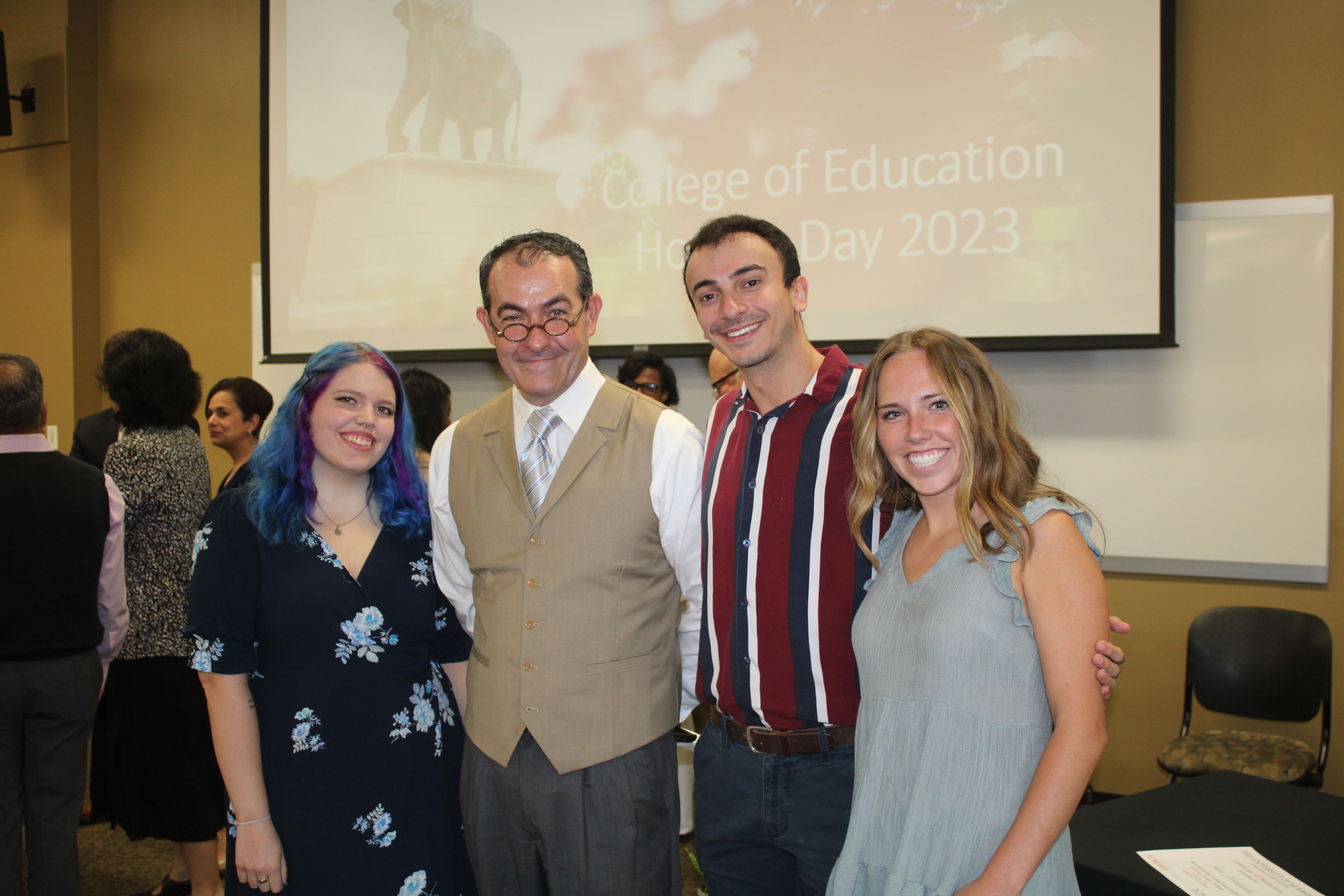
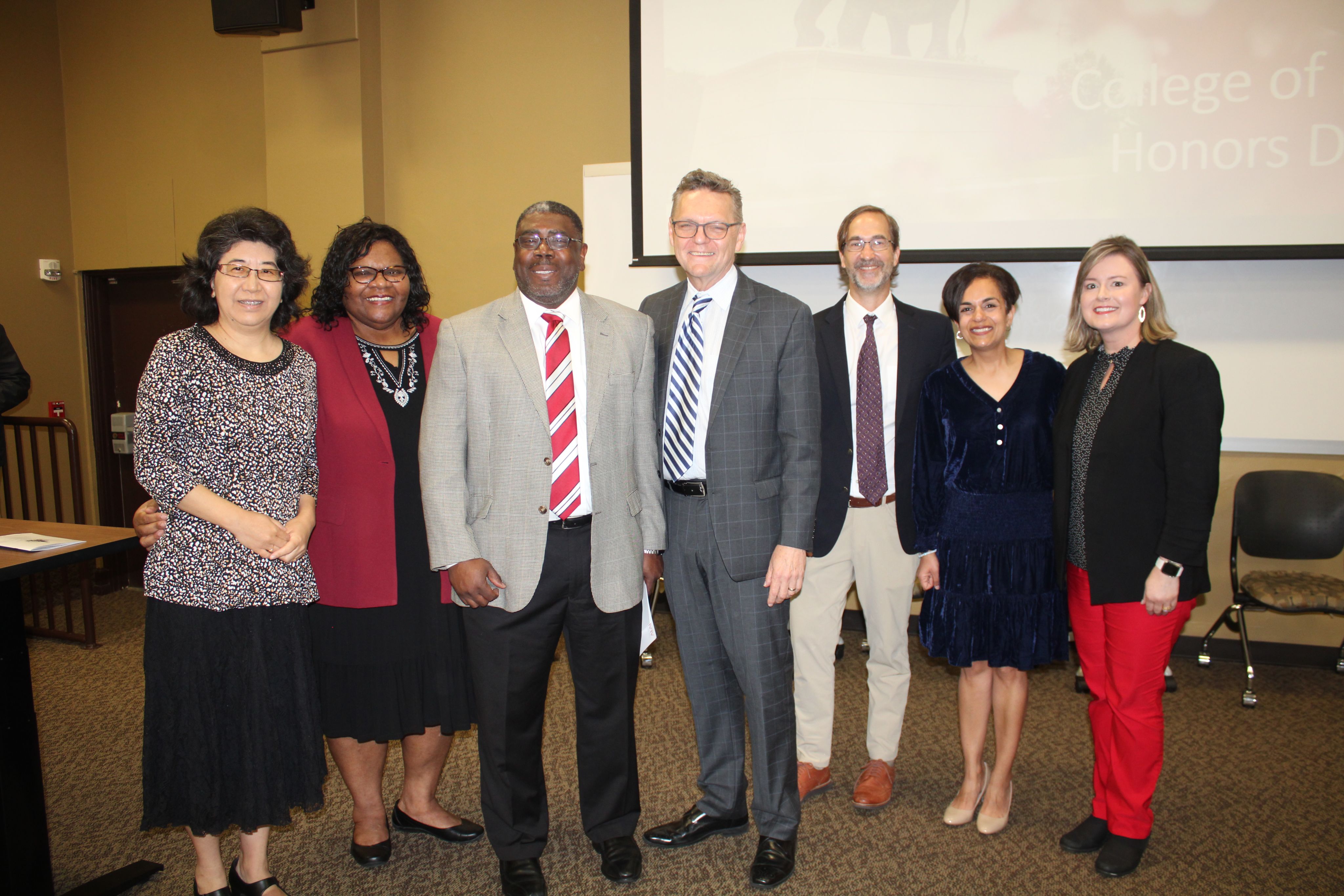



Honors Day 2023
Most Outstanding Student Awards
Department of Curriculum & Instruction
- Early Childhood Education (Undergraduate) — Emma Lawson
- Elementary Education (Undergraduate) — Ashley Crockett
- Elementary Research (Graduate) — Erin Rich
- Elementary Service (Graduate) — Kristin Johnson
- Elementary Teaching (Graduate) — Jane Sulser
- Secondary English Language Arts (Undergraduate) — Audrey Woodruff
- Secondary English Language Arts (Graduate) — Julia Nolen
- Secondary Foreign Language (Undergraduate) — Jack Lombardo
- Secondary Foreign Language (Graduate) — Marie Moore
- Secondary Mathematics (Undergraduate) — Samantha Adams
- Secondary Mathematics (Graduate) — Pam Smith
- Secondary Science (Undergraduate) — Cami Zahorscak
- Secondary Science (M.A.) — Caitlin Edwards Hanson
- Secondary Science (Ph.D.) — Sabrina Stanley
- Secondary Social Science (Undergraduate) — Jessica O’Neal
- Secondary Social Science (Graduate) — Michael Beer
Department of Educational Leadership, Policy, & Technology Studies
- Educational Leadership — Ph.D. Darryl Washington
- Educational Leadership — Ed.D. Preeti Nichani
- Educational Leadership — Instructional Leader, Ed.S. Alphus Shipman
- Educational Leadership — Library Media, Ed.S. Kat Baxter
- Educational Leadership — Teacher Leader, Ed.S. Danielle Butler
- Educational Leadership — M.A. Angie Morrison
- Higher Education Administration — Research (Ph.D.) Emily Decker
- Higher Education Administration — Service (Ph.D.) Undre Phillips
- Higher Education Administration — Teaching (Ph.D.) Elizabeth McDonald
- Higher Education Administration — Exec. Ed.D. Kirsten Henry
- Higher Education Administration — Ed.D. Jessika White
- Higher Education Administration — M.A. Michael Collins
- Higher Education Administration — M.A. (Online) Andrew (Ross) D’Entremont
- Higher Education Administration — Teaching Certificate Kayla Ballard
- Higher Education Administration — Service (M.A.) Jessica Rentz
- Instructional Technology — Ph.D. Jill Westerlund
- Instructional Technology — Innovation (Ph.D.) Chris Jenks
- Instructional Technology — Research (Ph.D.) Empress Searight
- Instructional Technology — M.A. Mary Lou Jones
- Social and Cultural Studies — Ph.D. Benjamin Ray
Department of Educational Studies in Psychology, Research Methodology, and Counseling
- Clinical Mental Health Counseling — Asheton Tanahey
- Counselor Education (Ph.D.) — Sylvia Hollins
- Counselor Education (Ed.S.) — Daniel Marshall
- Educational Psychology — Brianna “Z” Derevjanik
- Qualitative Research — Sun Young Gu
- Quantitative Research — Cheng Hua
- Rehabilitation Counseling — Carl Lynn
- School Counseling — Haley Tolbert
- School Psychology — Crystal Winton
Department of Kinesiology
- Exercise Science — Ph.D. Katie Sullivan
- Exercise Science — M.A. Delaney Baird
- Exercise Science (Undergraduate) — Tiffany Adams
- Sport Pedagogy (Graduate) — Adam Wolecki
- Physical Education Teacher Education (Undergraduate) — Ella M. Maggio
Department of Music Education
- Choral Music (Undergraduate) — Bethany Knight Peppers
- Choral Music (Graduate) — Donna T. Smith
- Instrumental Music (Undergraduate) — John Niiler
- Instrumental Music (Graduate) — Patrick Greene and Caroline Wright
Department of Special Education & Multiple Abilities
- Autism (Graduate) — Kelsey Thompson
- Collaborative Teacher (Undergraduate) — Lauran Wilcoxson
- Collaborative Teacher, Multiple Abilities Program Cohort (Graduate) — Taylor Townsend Moorer
- Gifted and Talented (Graduate) — Jessica Schmauch
- Early Childhood Special Education (Undergraduate) — Madelyn Beard
- Multiple Abilities Program (Undergraduate) — Icie Wriley
- Severe Disabilities — Caroline Kelly
- CrossingPoints Certificate in Occupational Studies — Richard Tucker
Graduate Research, Teaching, & Service Awards
- Outstanding Teaching by a Master’s Student — Ford Patronas
- Outstanding Teaching by a Doctoral Student — Annie Mulholland
- Recognition for Excellence in Research by a Doctoral Student — Paton Michelle Roden
- Most Outstanding Research by a Doctoral Student — Carlson Coogler
- Recognition for Excellence in Service by a Graduate Student — Paton Michelle Roden
- Most Outstanding Service by a Graduate Student — Jacob Feiler
- Recognition for Excellence in Dissertation Research
Dr. Elizabeth L. Michael
Embedding Choice Making into the Self-Regulated Strategy Development Instructional Approach for Students in a Residential Treatment Facility
Dissertation Chairs: Kristine Jolivette & Nicole Swoszowski - M. Ray Loree Most Outstanding Dissertation
Dr. Kimberly G. Stephenson
Comparing Pre-Service and In-Service Teachers’ Perceptions in Fostering Creativity
Dissertation Chairs: Jennifer Jolly & Kristen Lamb
Departmental Awards
- Janice Bargdill Wilson Award for Excellence in Teaching with Children’s Literature
Caroline Fraser - Dr. Adolph B. Crew Teaching Award
Melinda Walker - Judy L. Bonner Award for Nurse Educator of the Year
Angela Durry - George H. Stopp Academic Achievement Award
Jennifer Walker - The University of Alabama Adapted Athletics Academic Award
Joy Haizelden - Jasper Harvey Award for Excellence in Graduate Studies
Megan Fedewa - Tommy Russell Award for Excellence in Doctoral Studies
Allie Marques Cramer - Stephen A. Willard Memorial Award
Hannah Merrill - Kappa Delta Pi Award Distinguished Undergraduate Scholar
Marie Moore

CrossingPoints CCOS Graduates Second Cohort
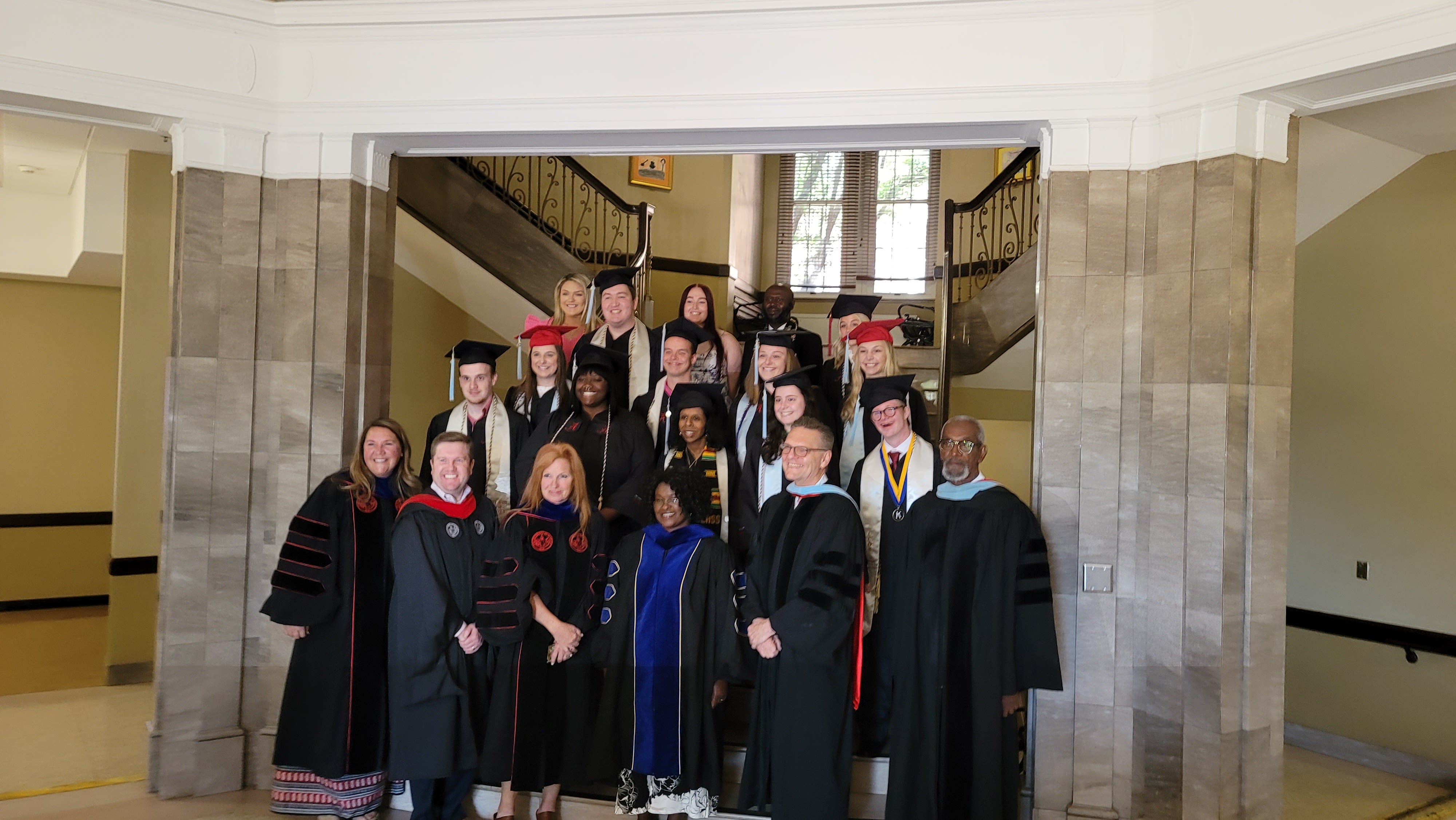
2023 Graduating Students & Mentors
The following CrossingPoints CCOS program members received their stoles and cords during a ceremony on May 4:
• Jordan Alise Alexander
Bachelor of Science in Secondary Education, Social Studies
• Rachel Reka Brady
Bachelor of Science in Kinesiology with minor in Psychology
• Phillipe Mmbro Buadee
Master of Arts, College of Communication & Information Sciences
• KayLee Brock Daw
Bachelor of Arts in History with minor in Philosophy
• Emily Isabella Haines
Bachelor of Science in Human Environmental Sciences, College of Human Environmental Sciences
• Chandler Grant Herrero
CrossingPoints Certificate in Occupational Studies
• Samantha Nicole Levin
Bachelor of Science in Public Health with minor in Food & Nutrition
• Claire Elizabeth Lutz
Bachelor of Science in Special Education, Collaborative K-12 with minor in Communicative Disorders
• Kaitlyn Brooke McDaniel
Bachelor of Science in Special Education, Collaborative K-12
• Margaret Grace McGough
Master of Arts in Educational Psychology
• William Reese Owsley
CrossingPoints Certificate in Occupational Studies
• Jack Henry Sisson
CrossingPoints Certificate in Occupational Studies
• Manasa Surianarayanan
CrossingPoints Certificate in Occupational Studies
• Richard Worth Tucker
CrossingPoints Certificate in Occupational Studies
• Lauran Elizabeth Wilcoxson
Bachelor of Science in Special Education, Collaborative K-12
By Rebecca Ballard, Ph.D., College and Alumni Relations Coordinator, and Kelcey Sexton, Communications Specialist
